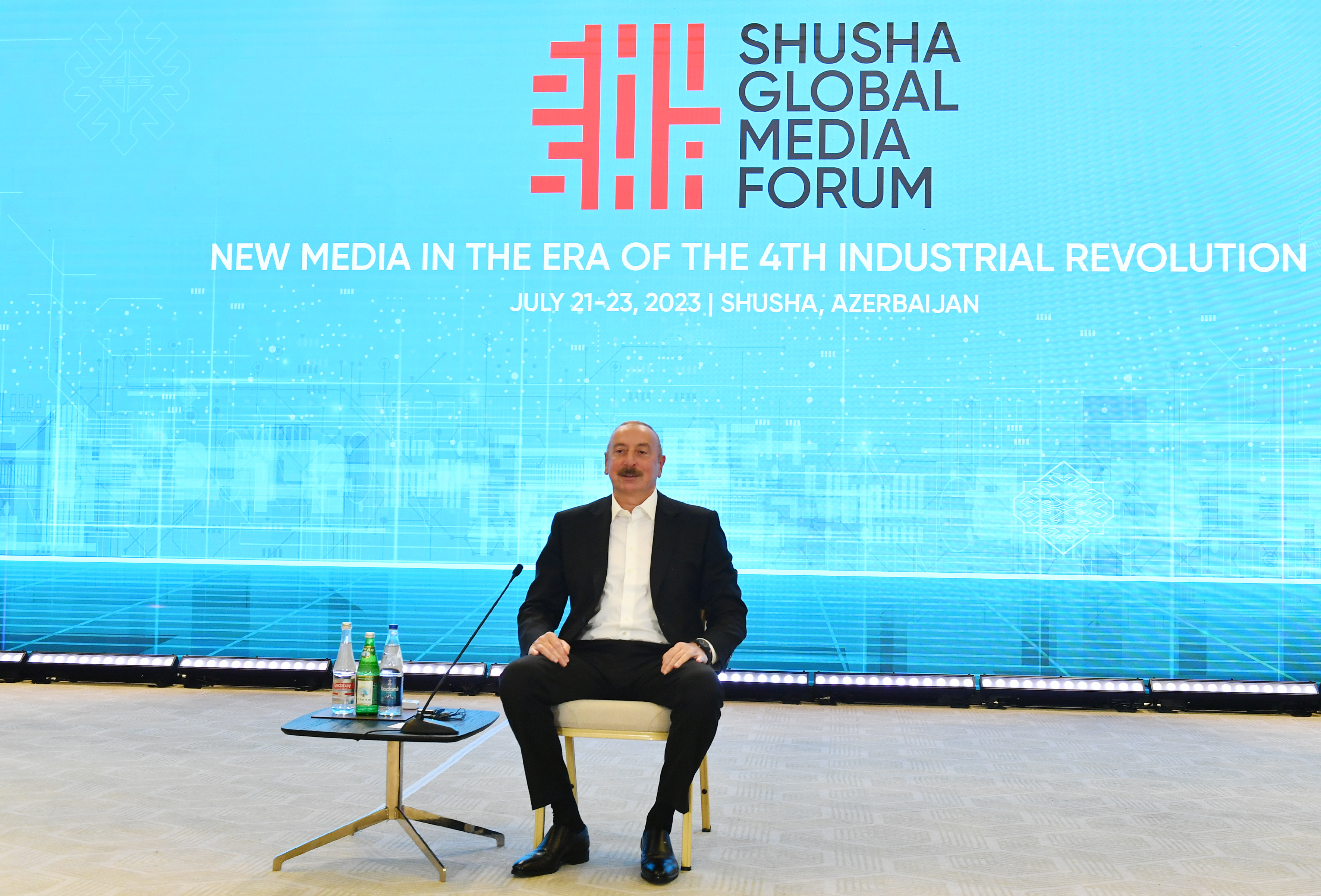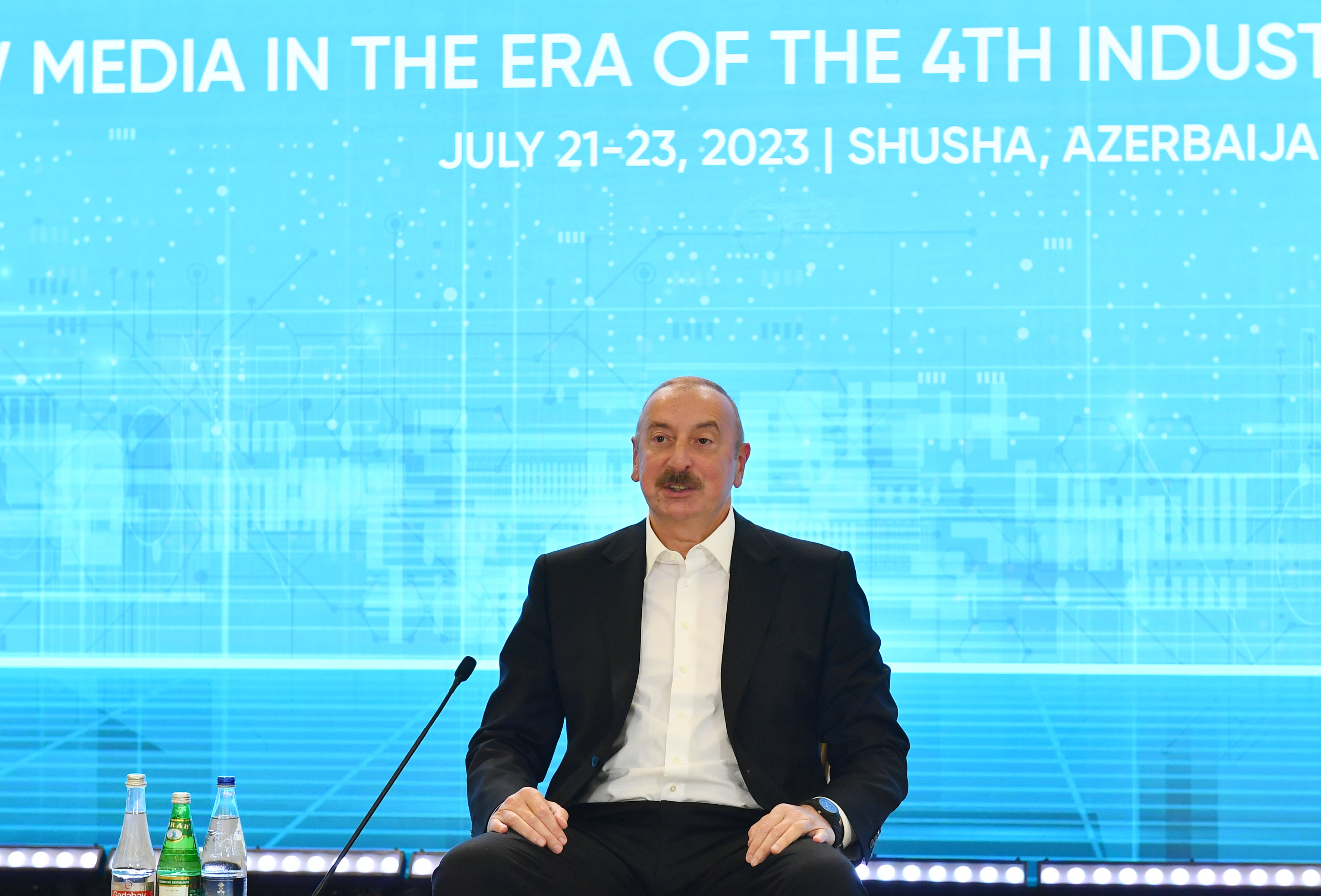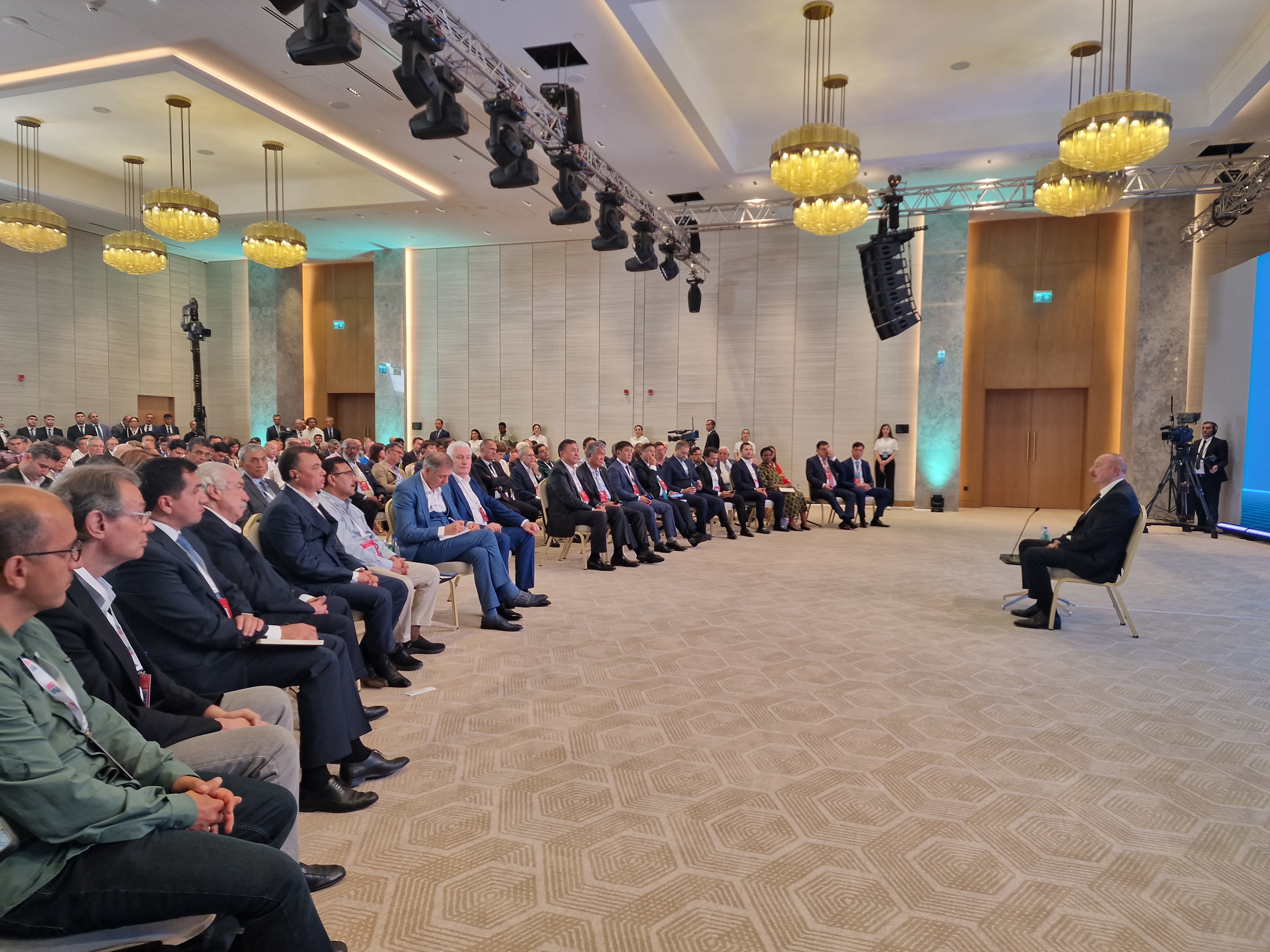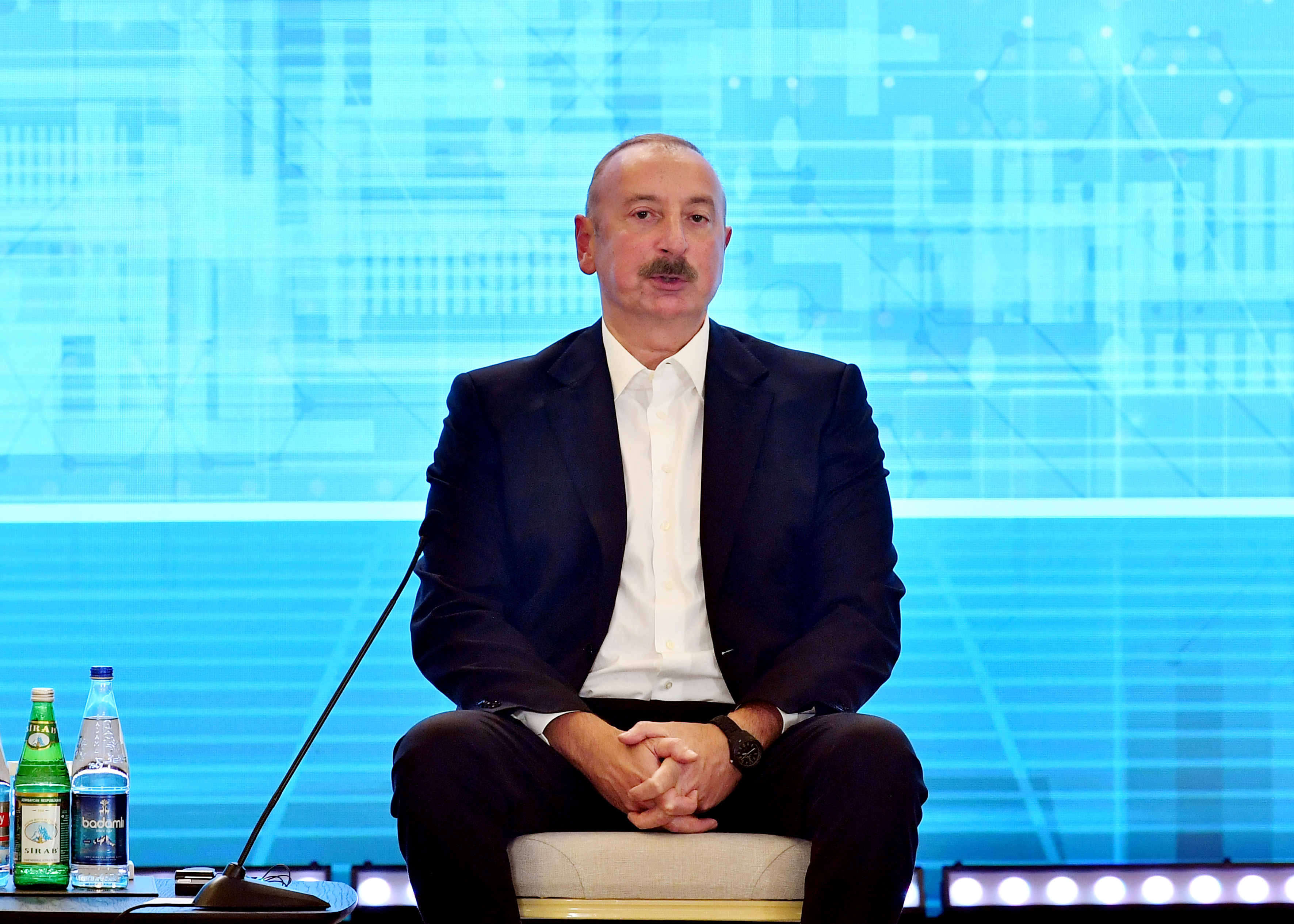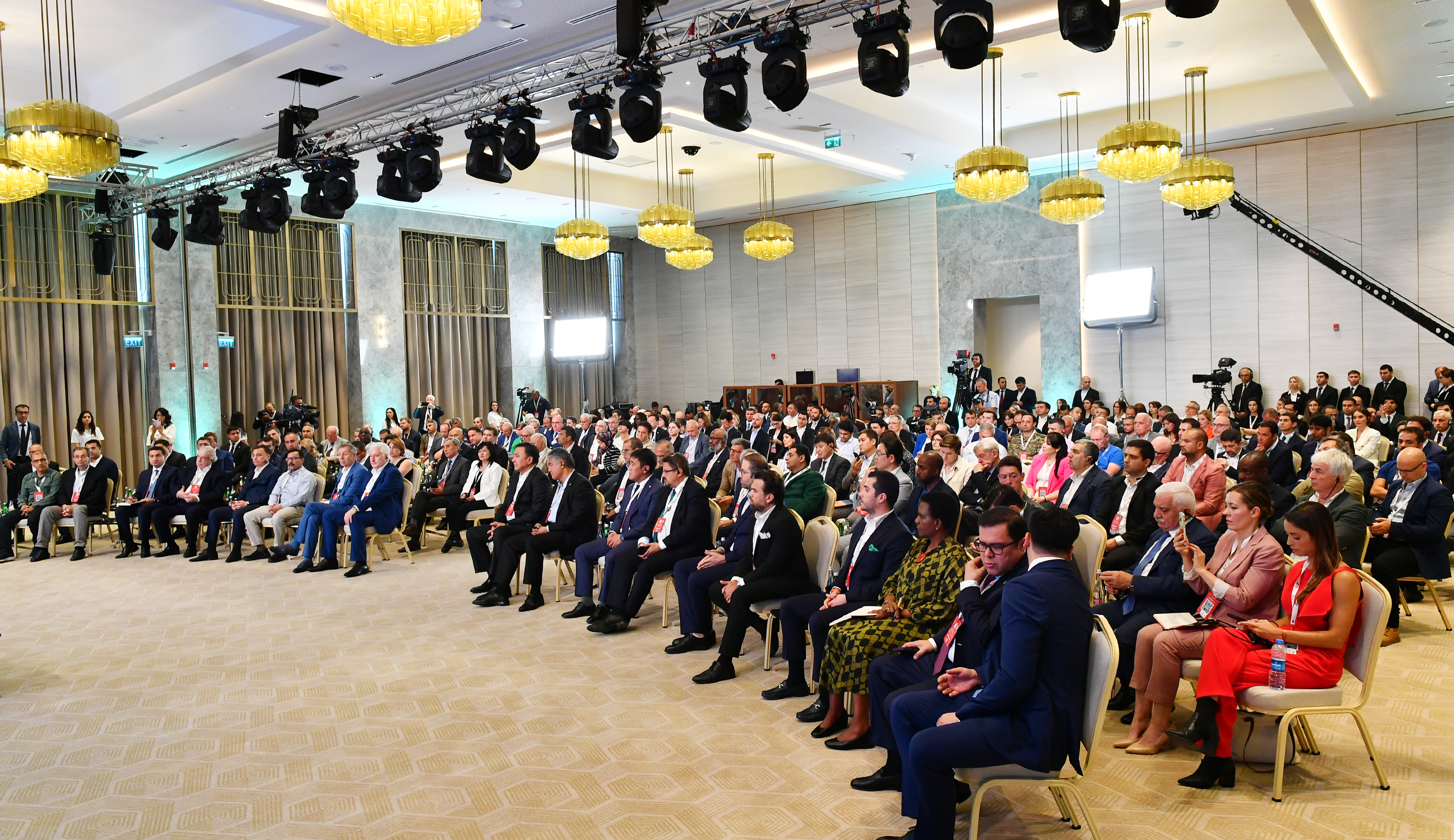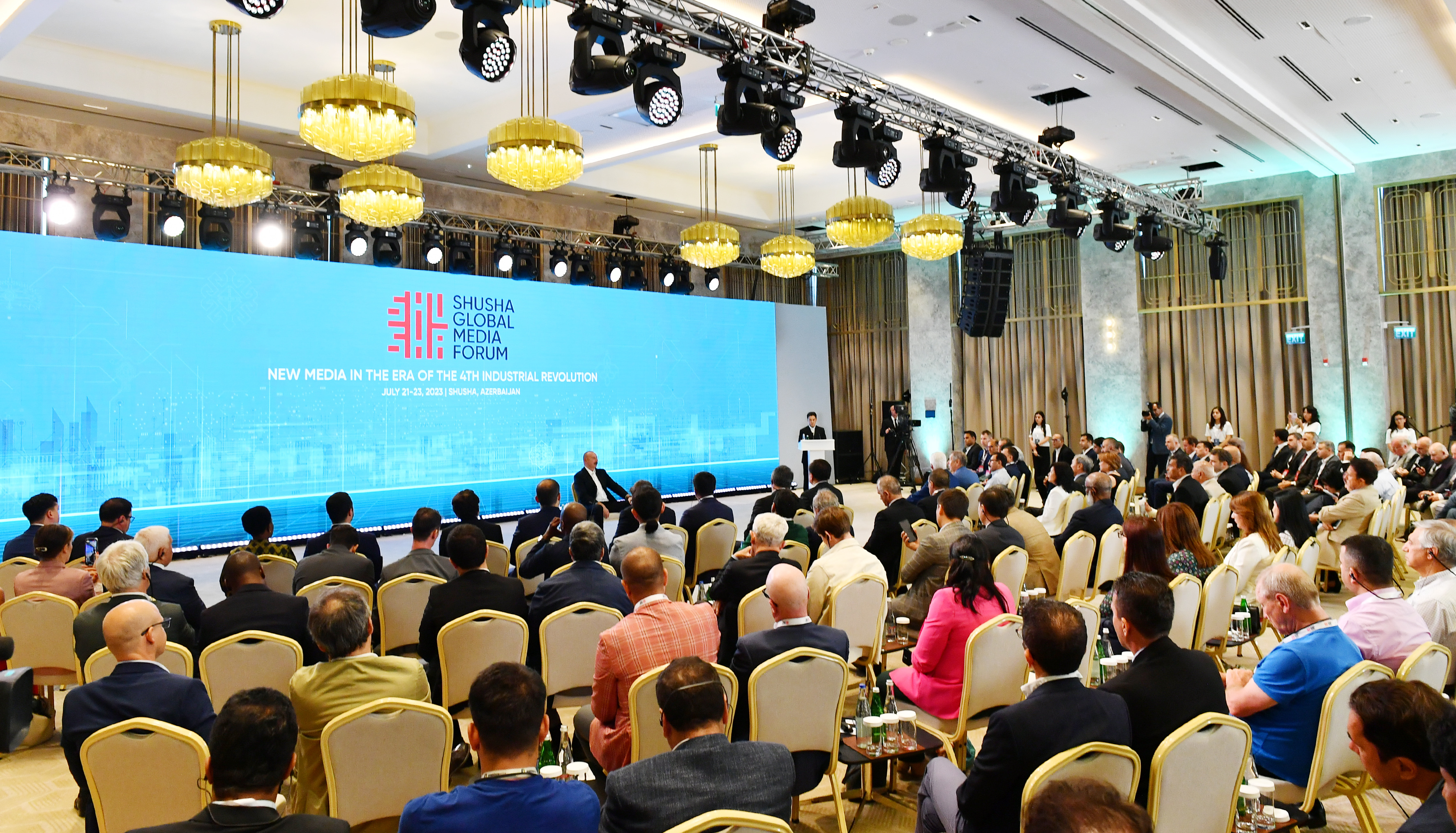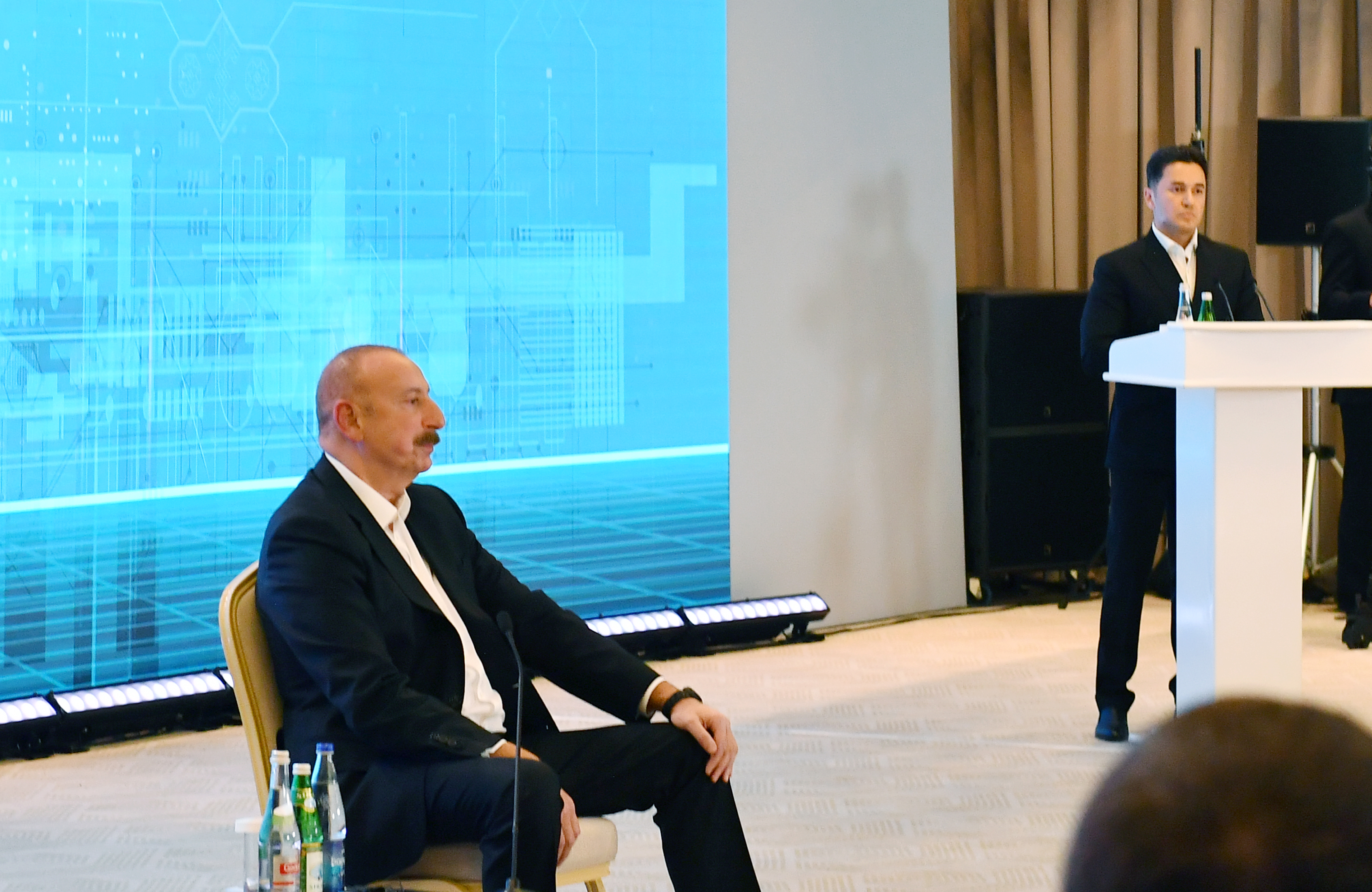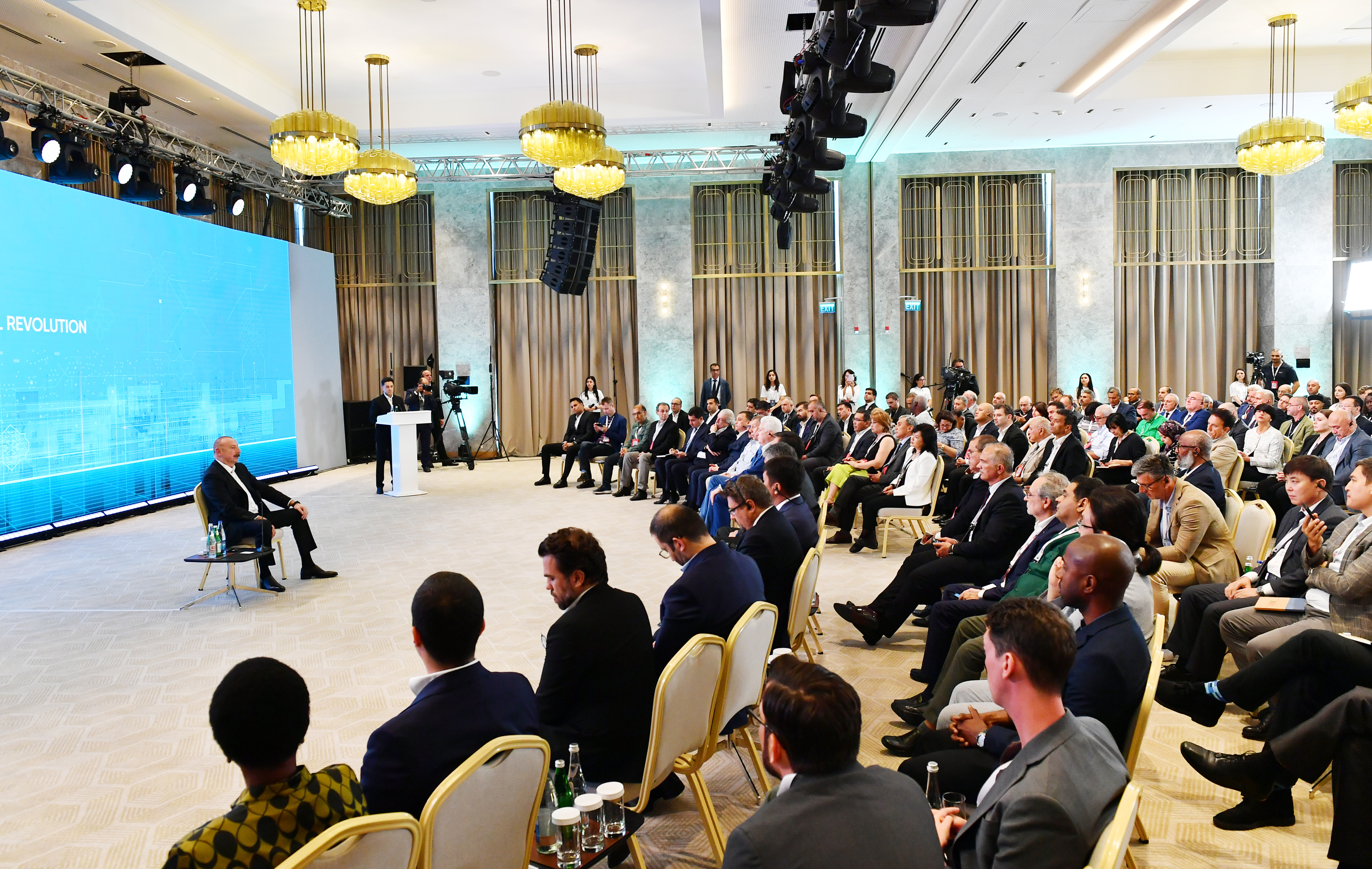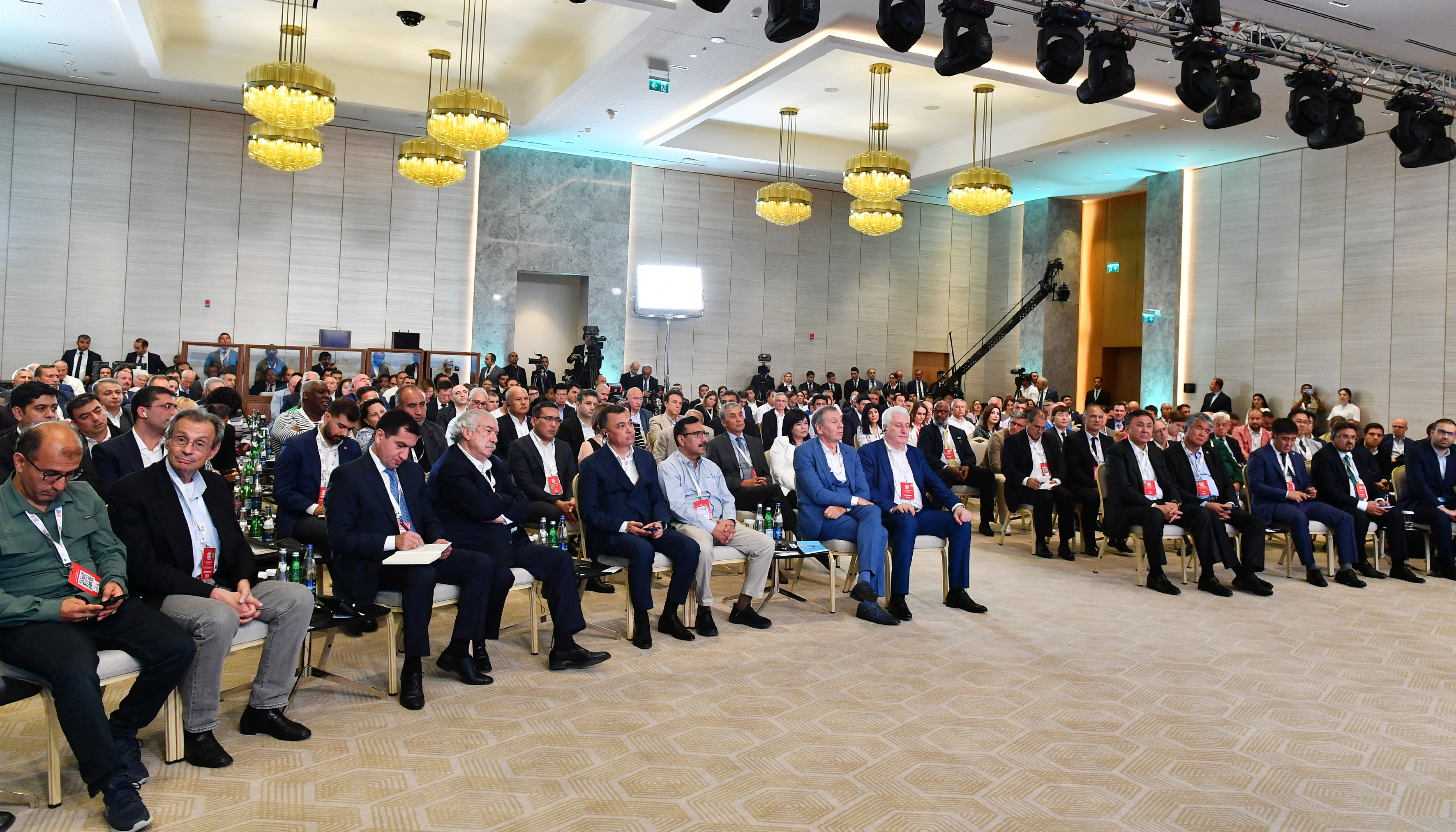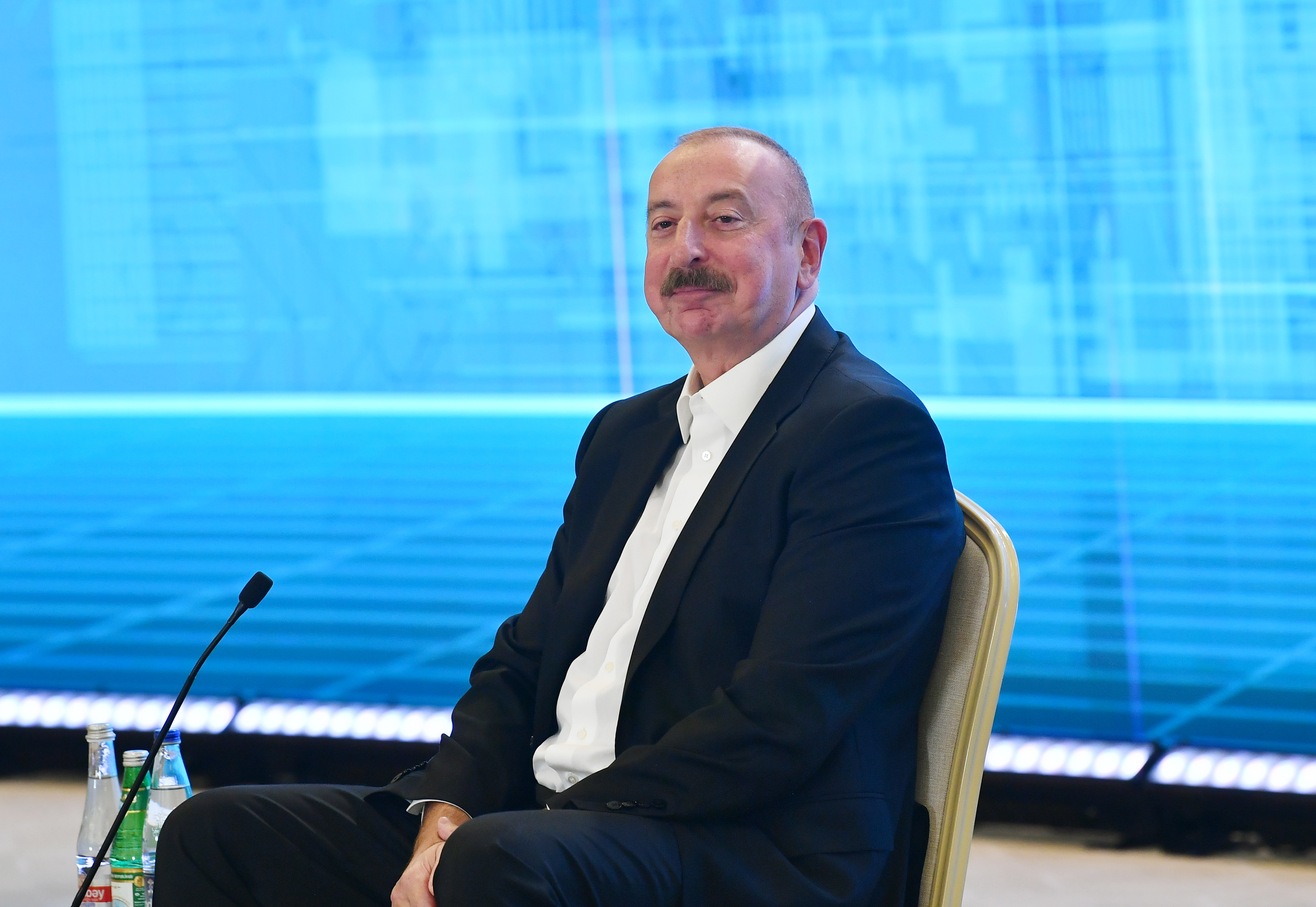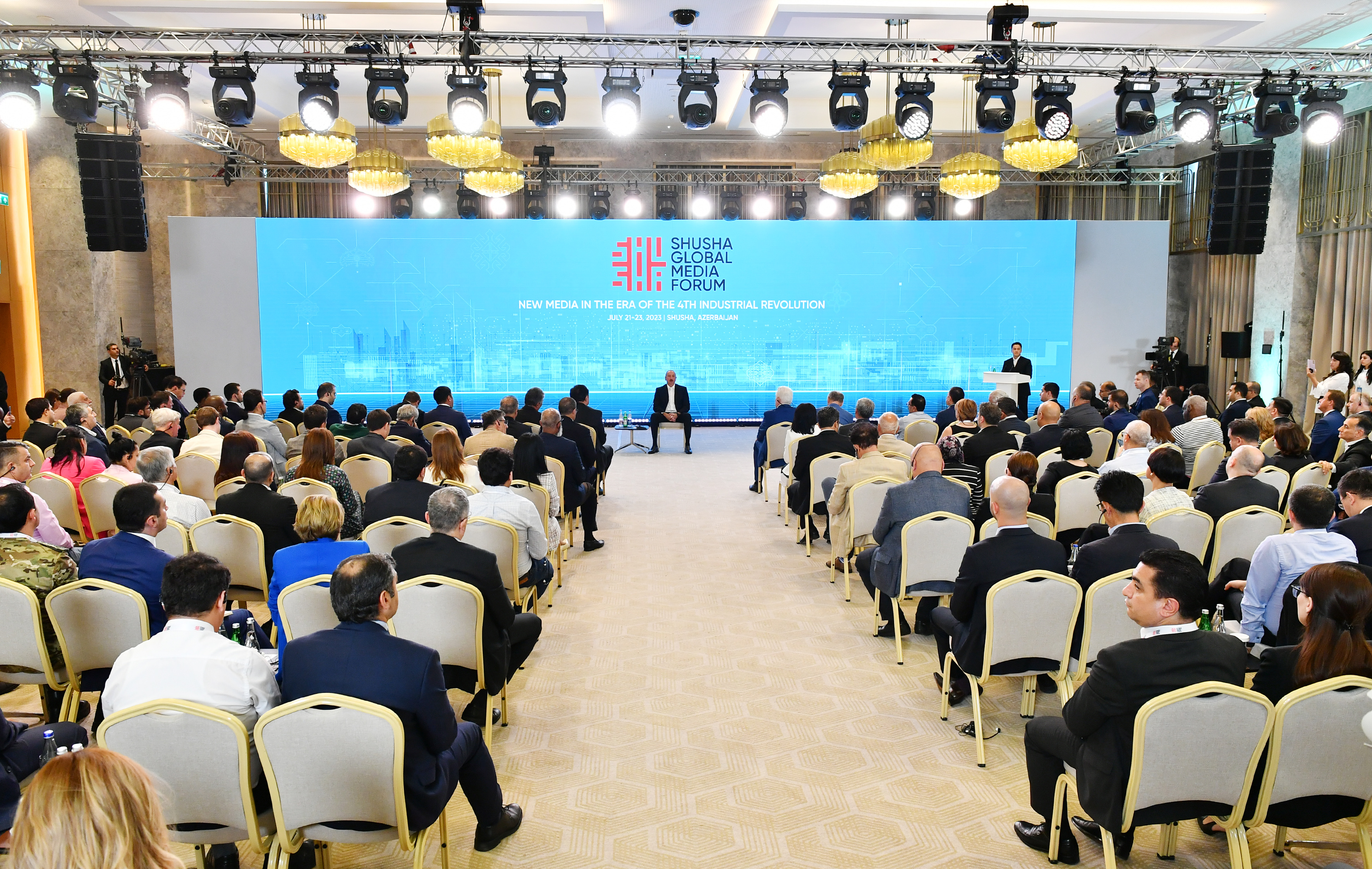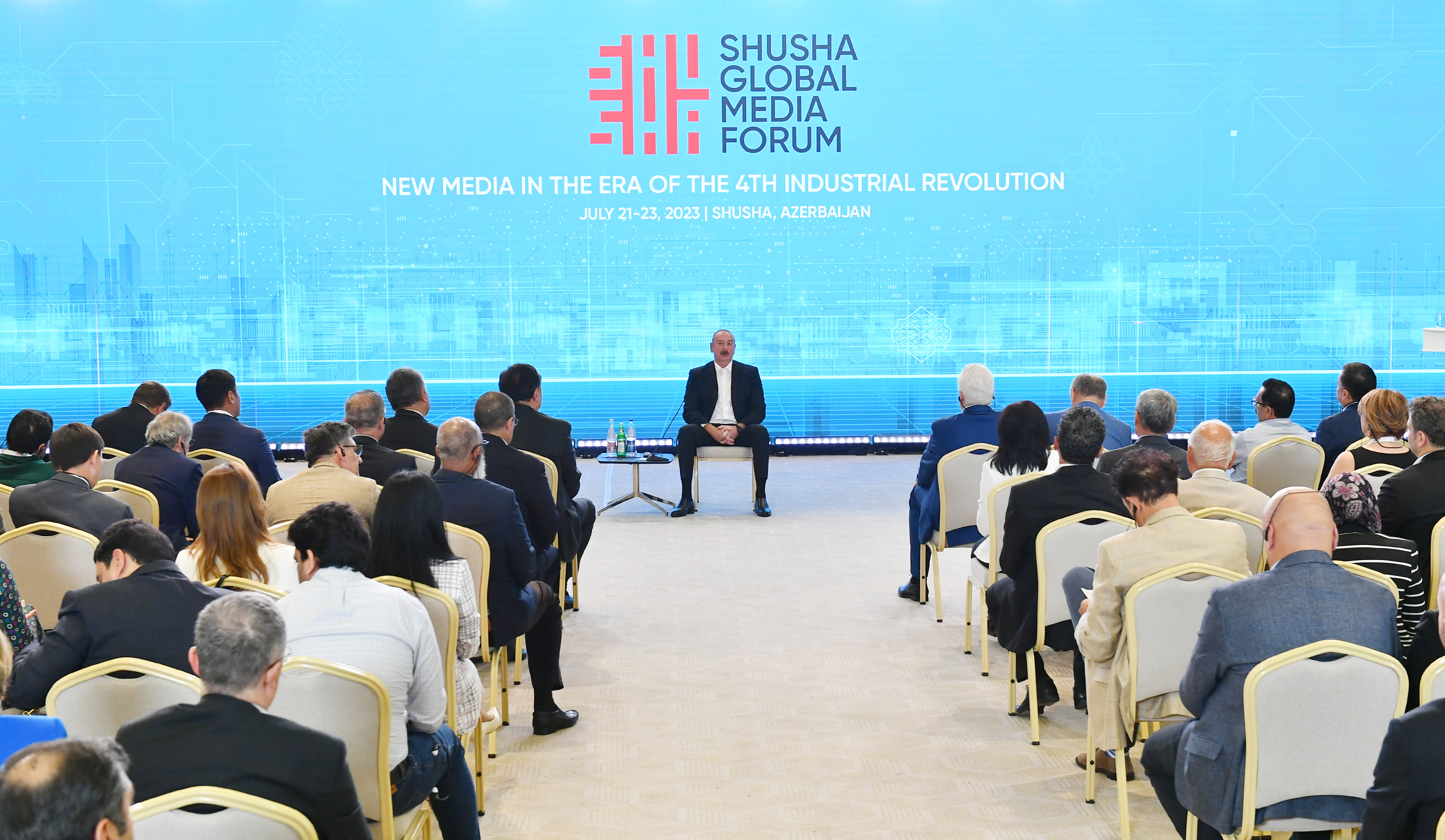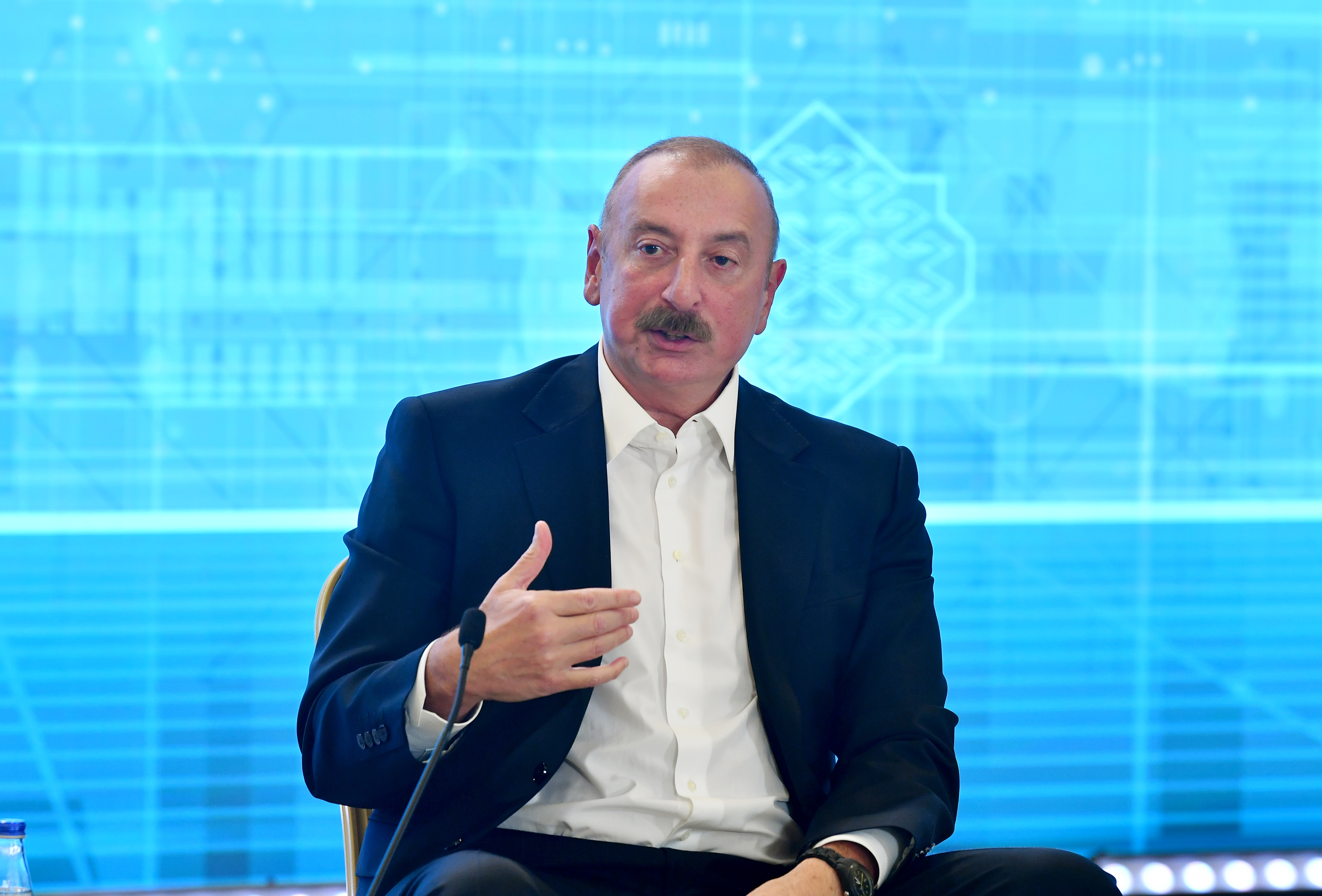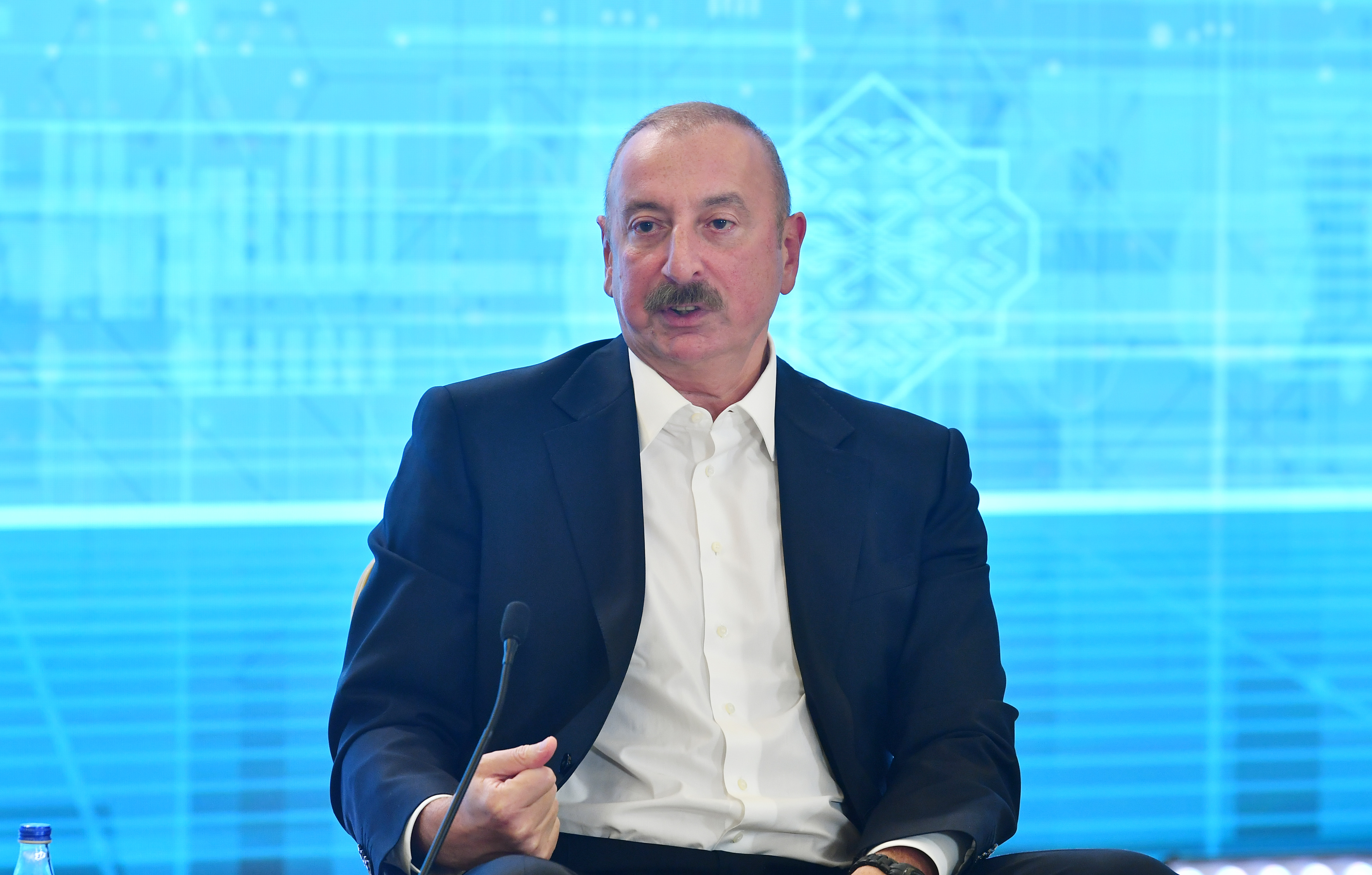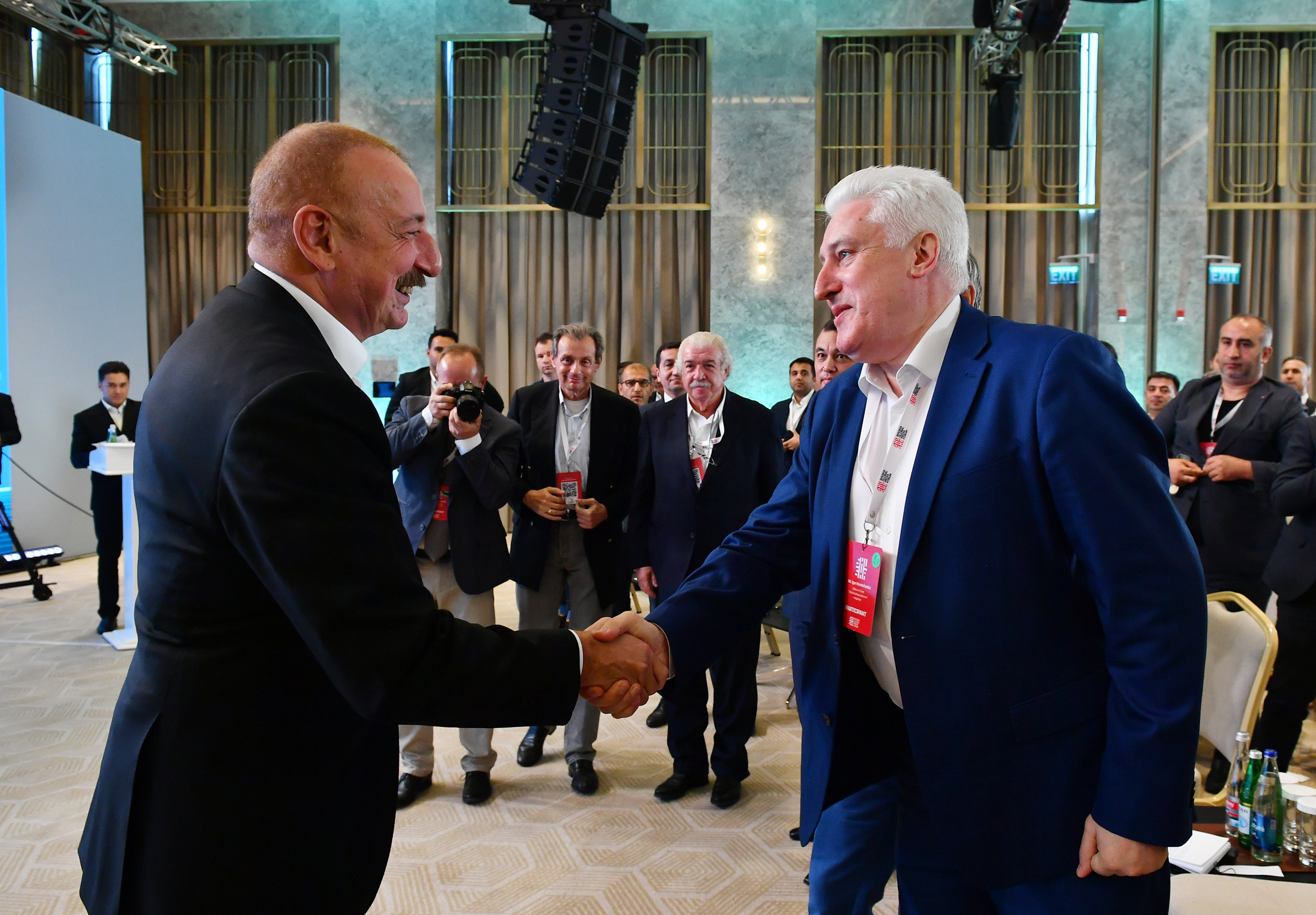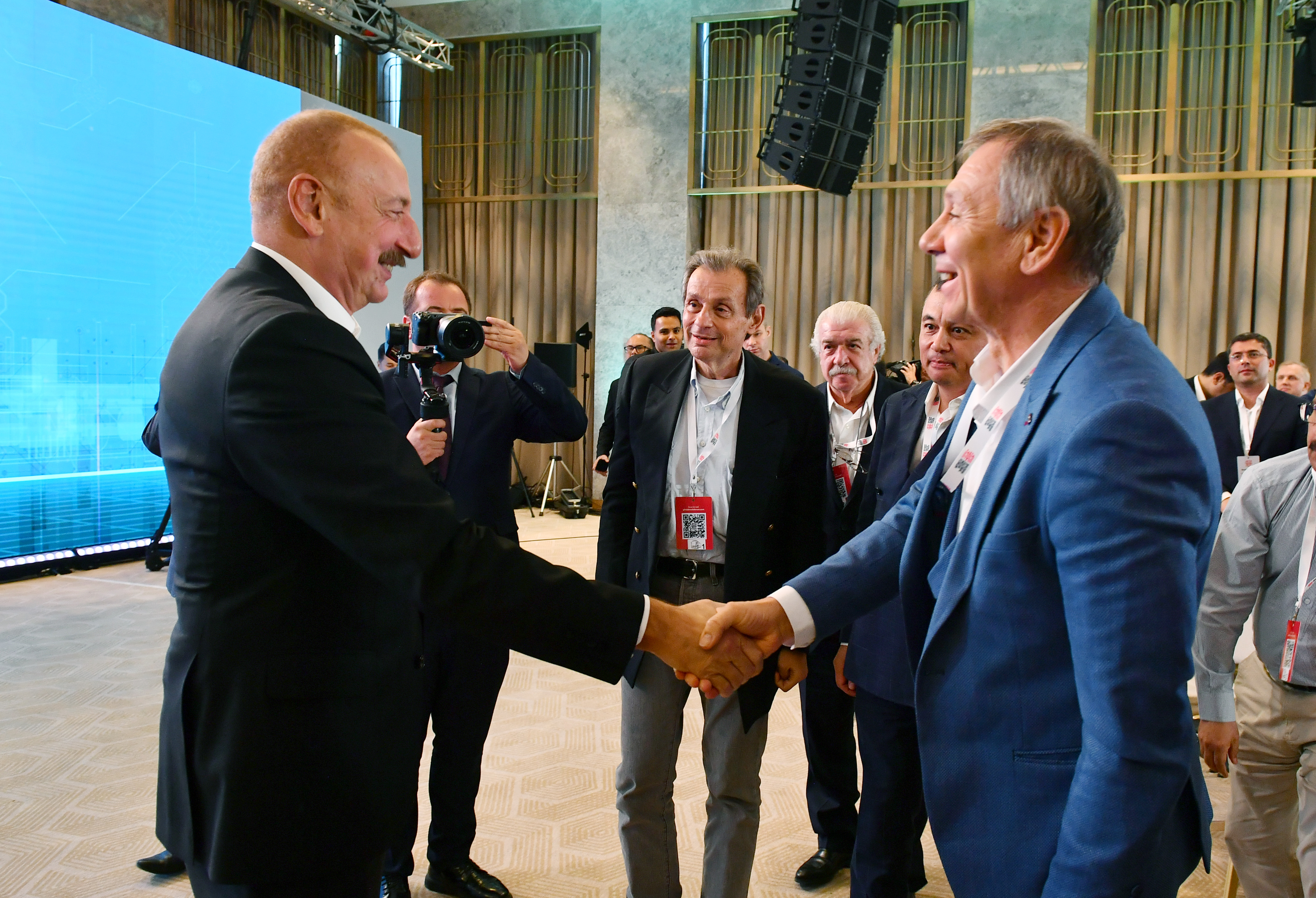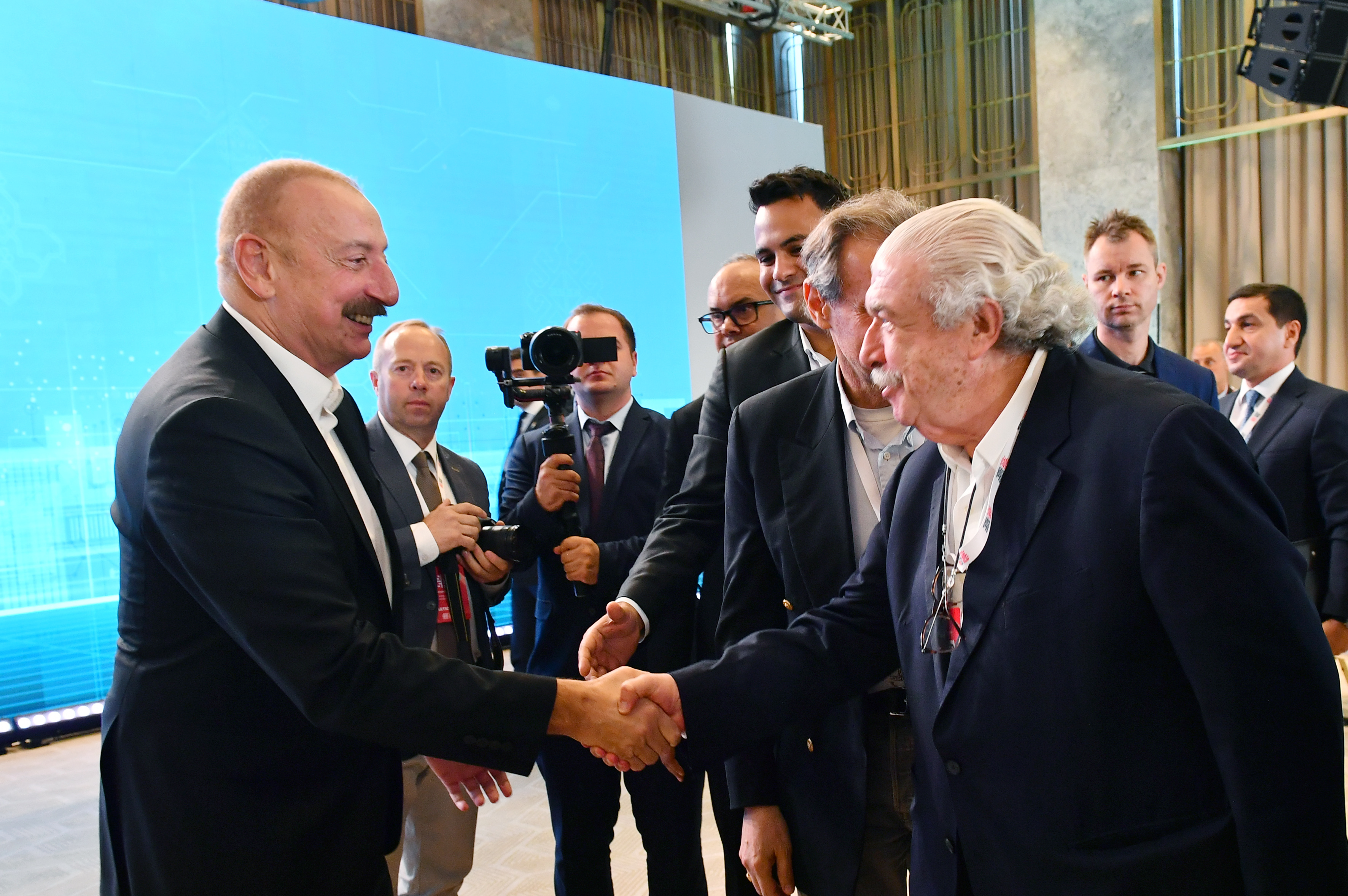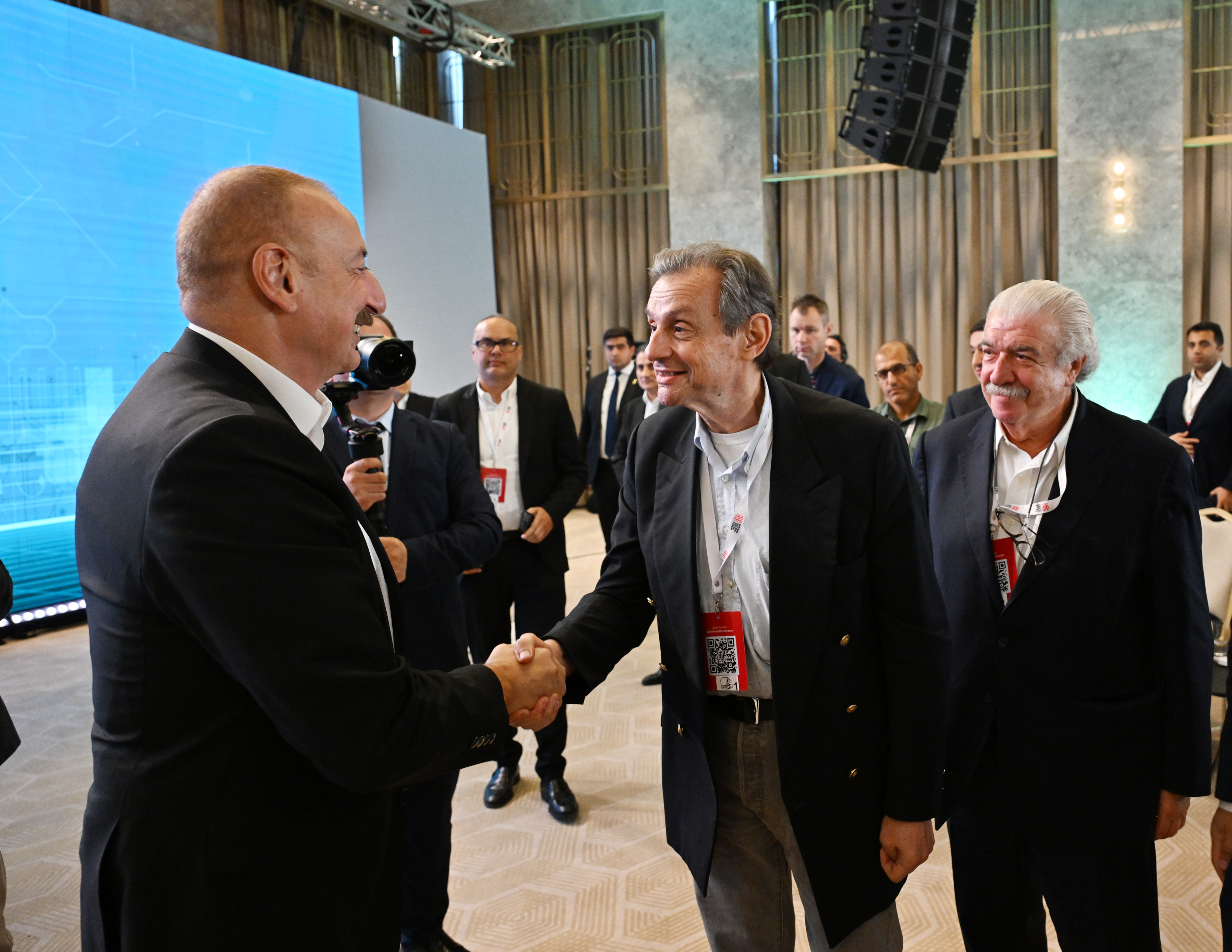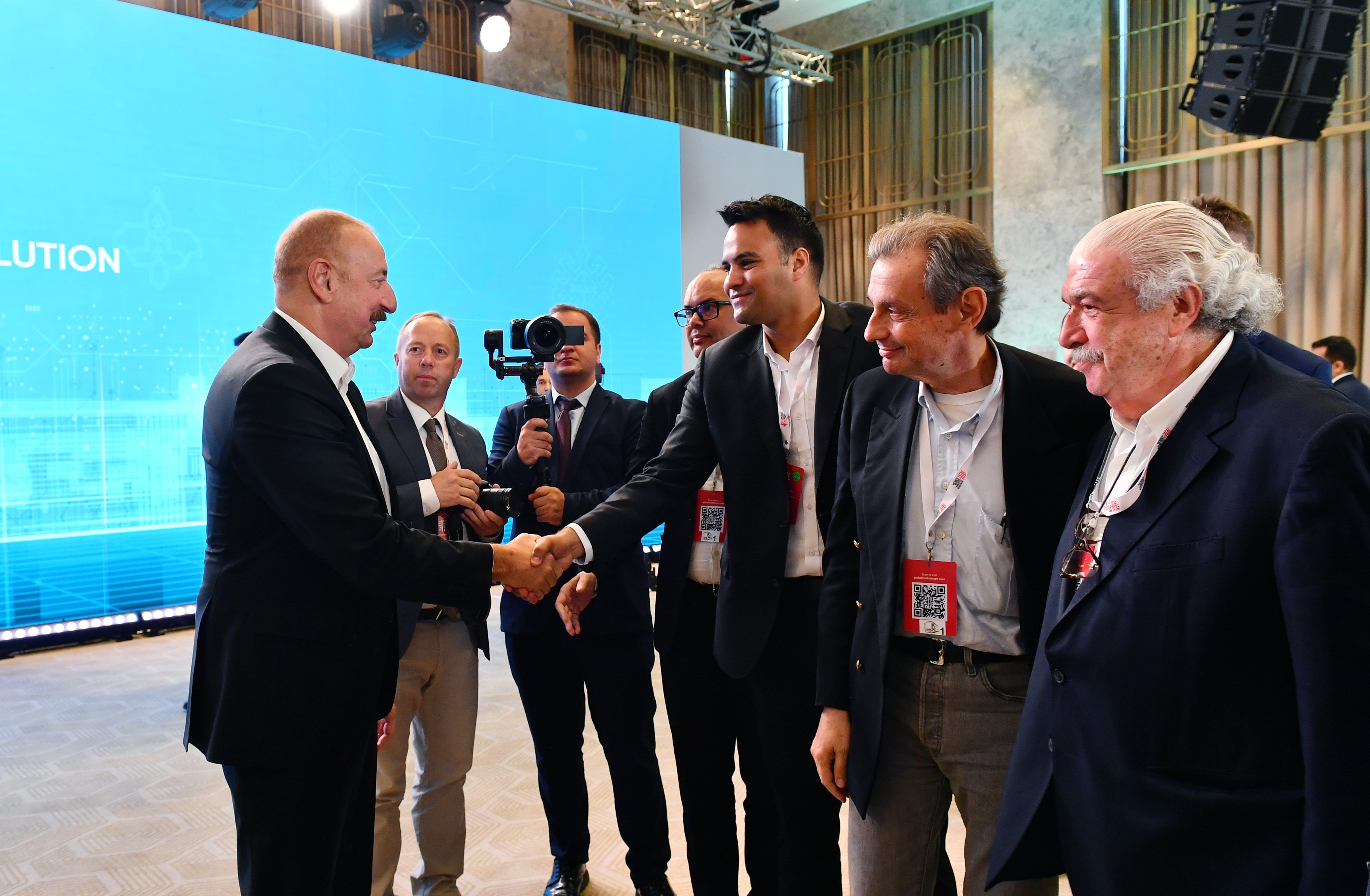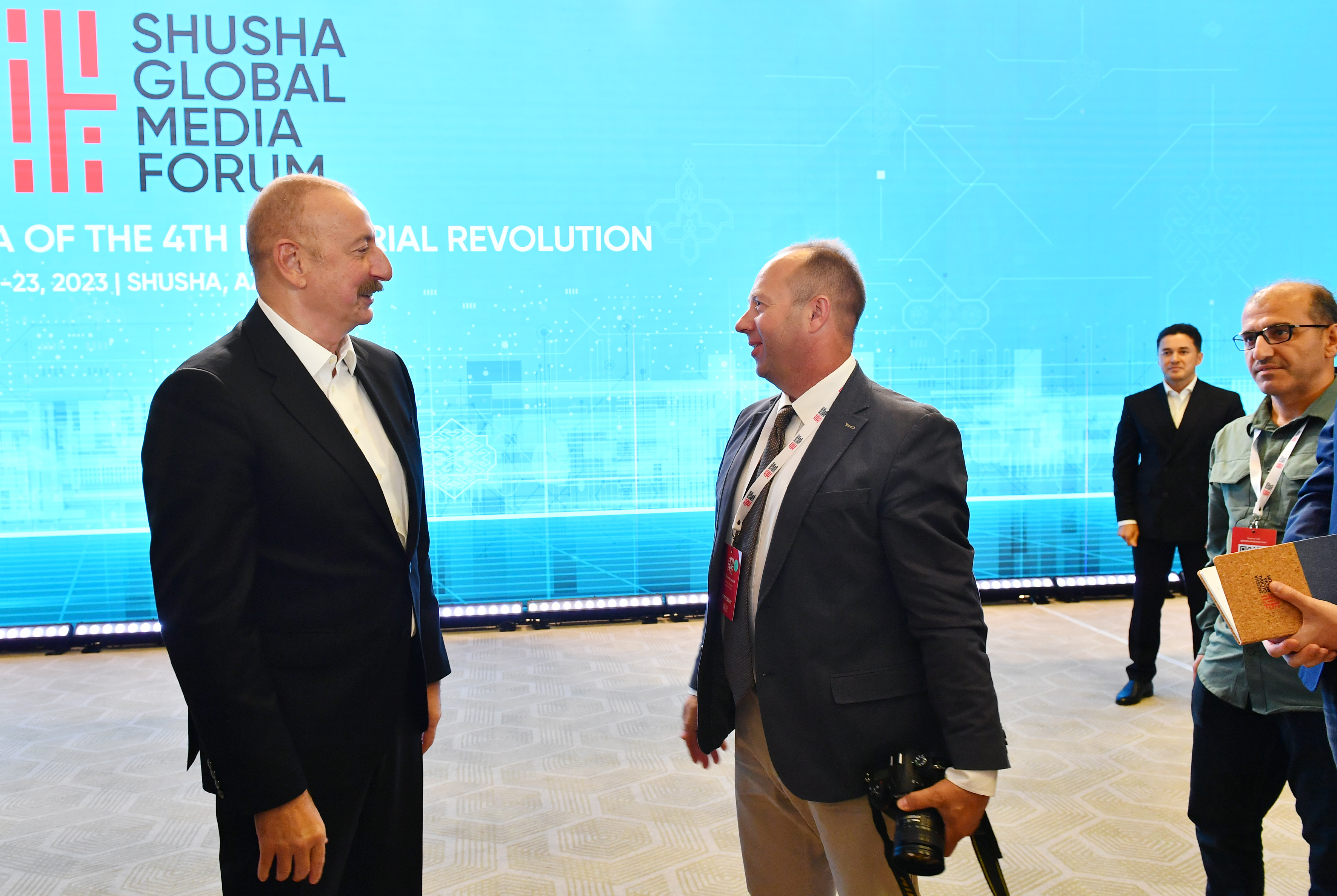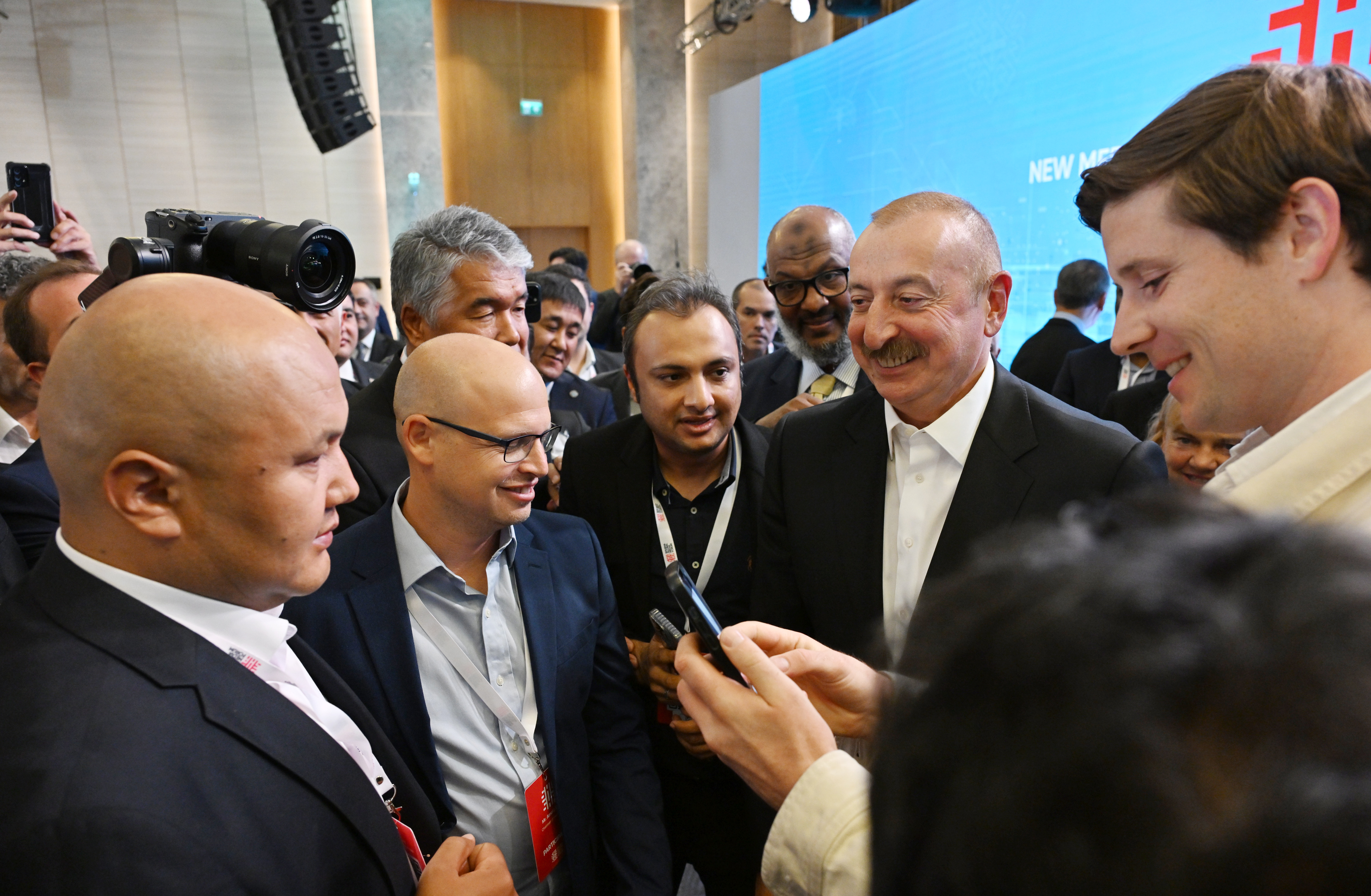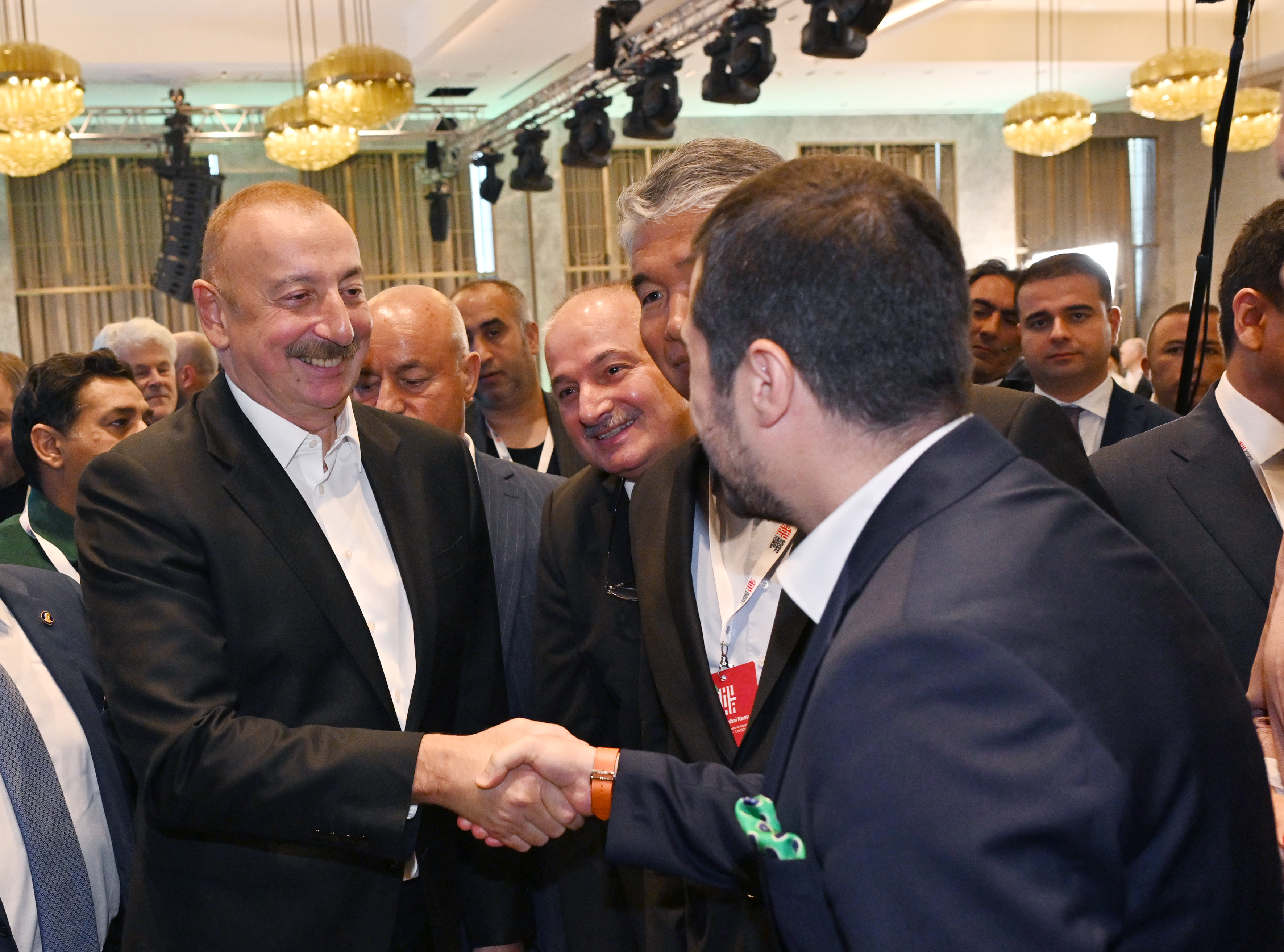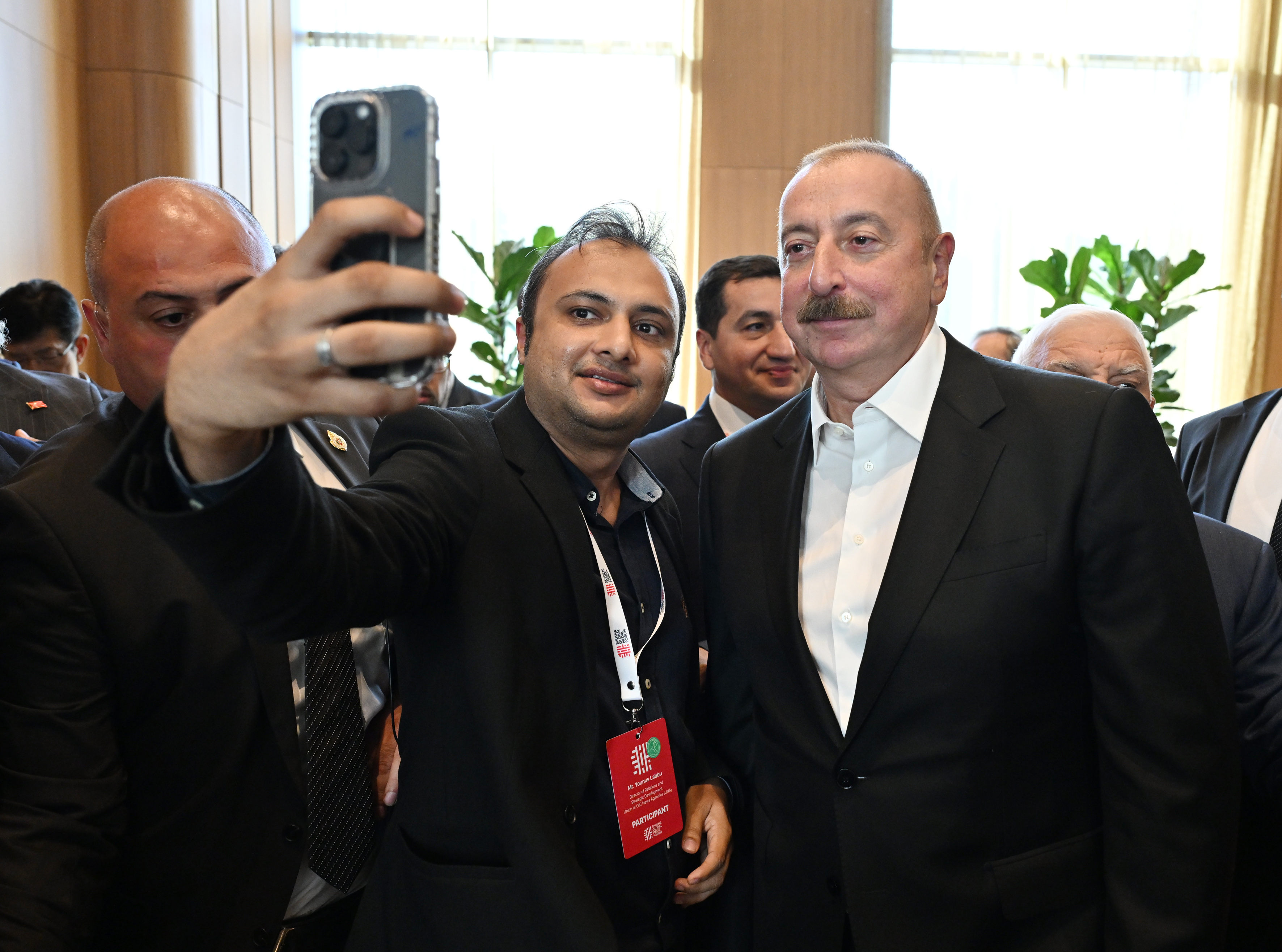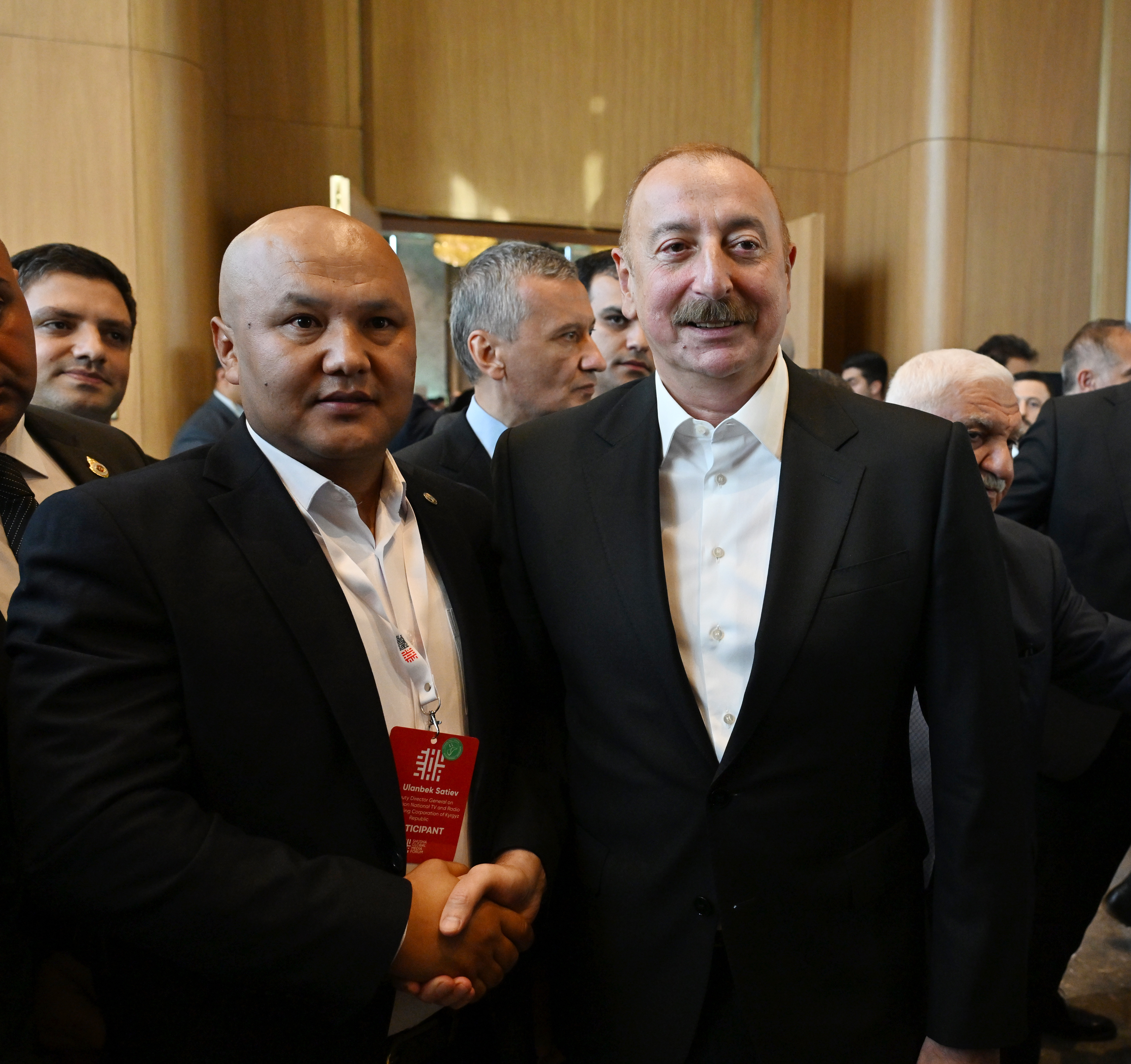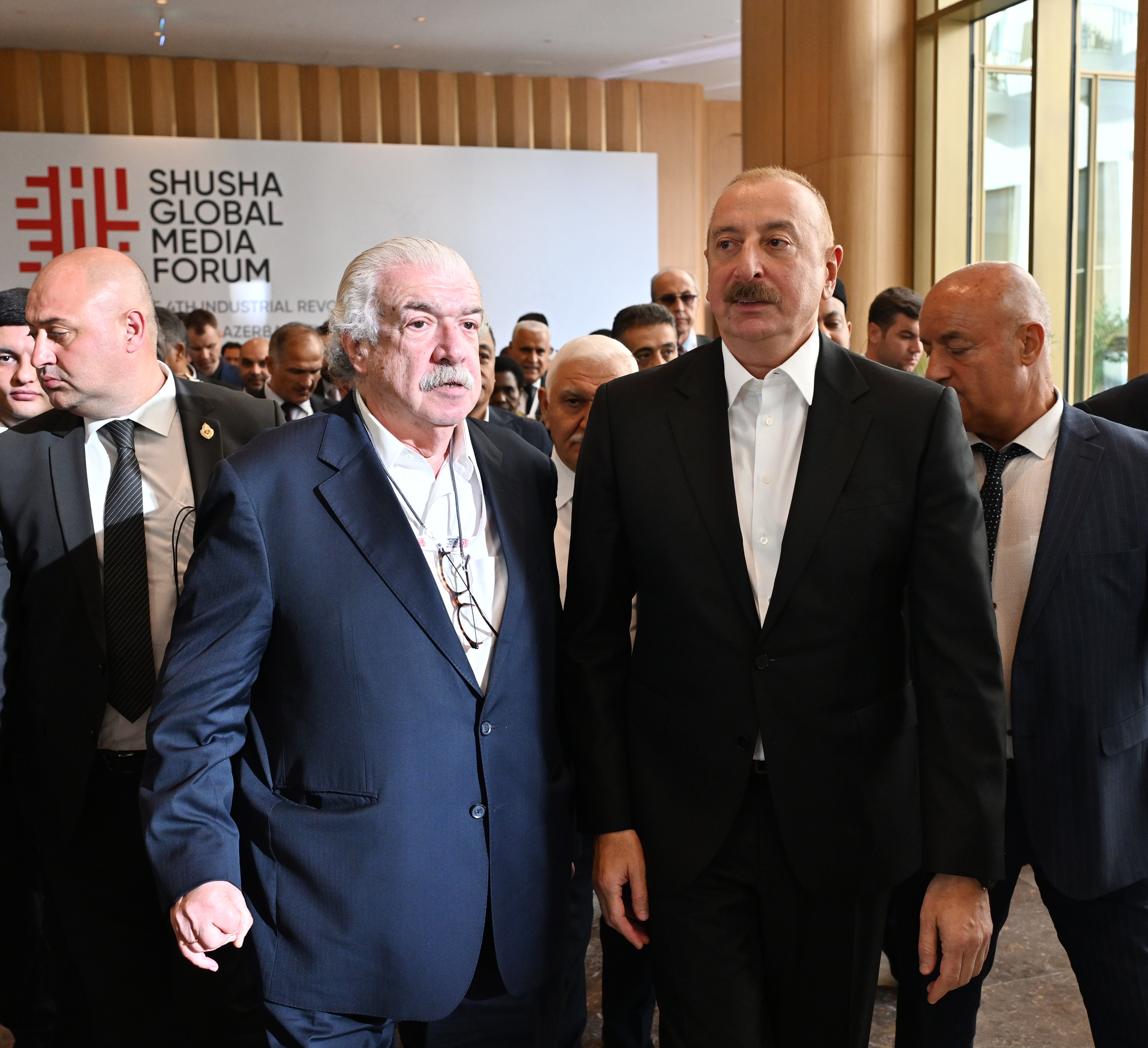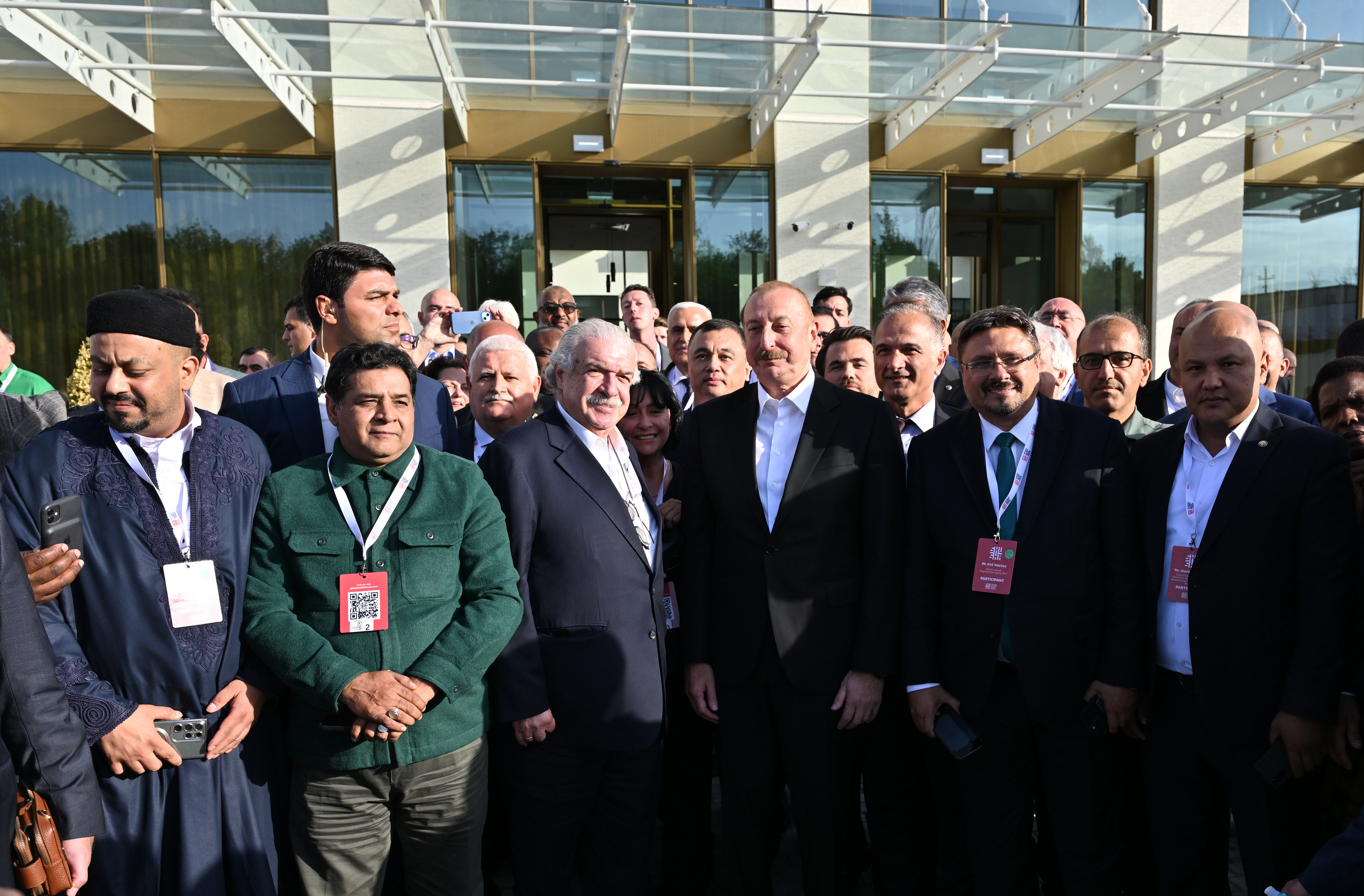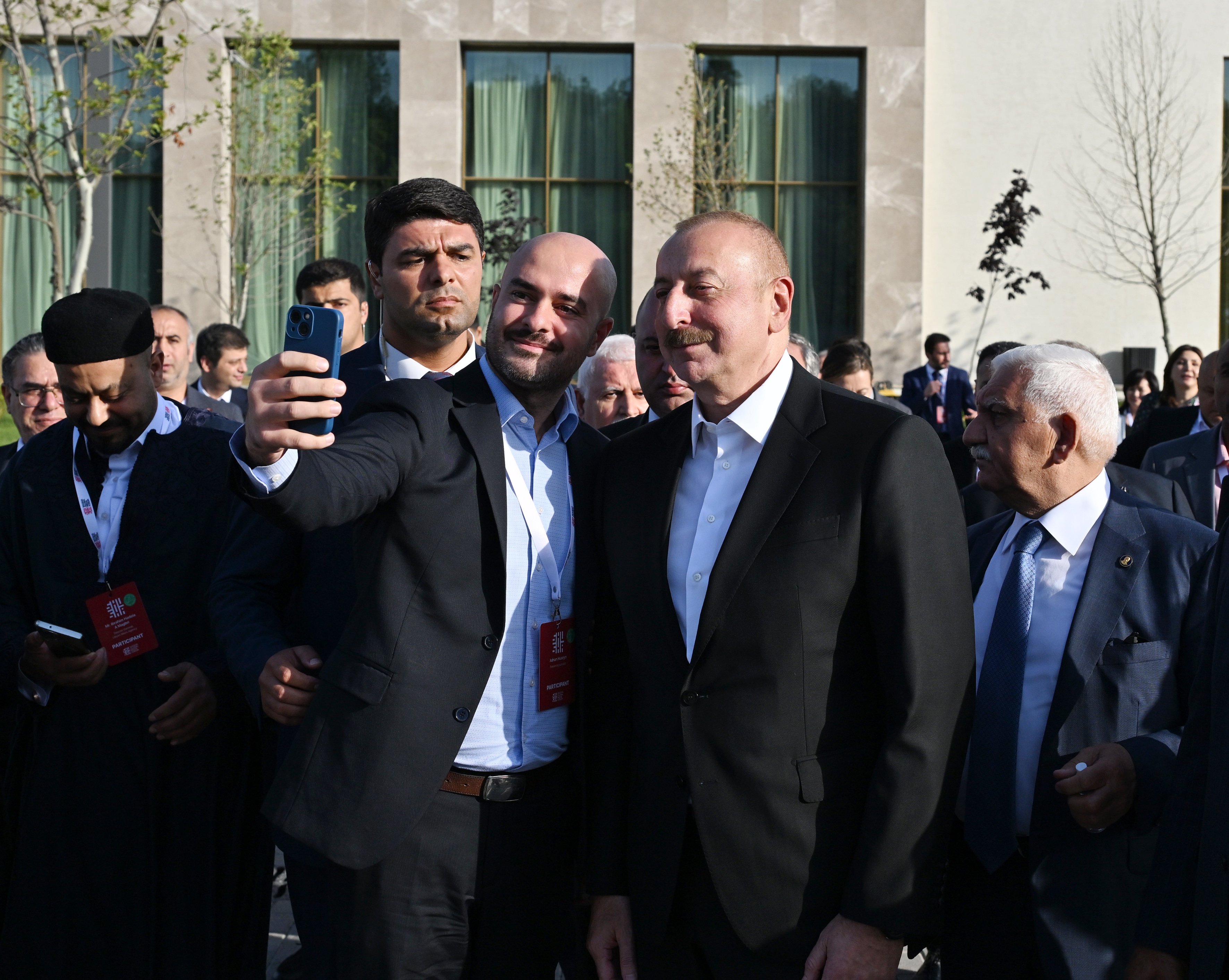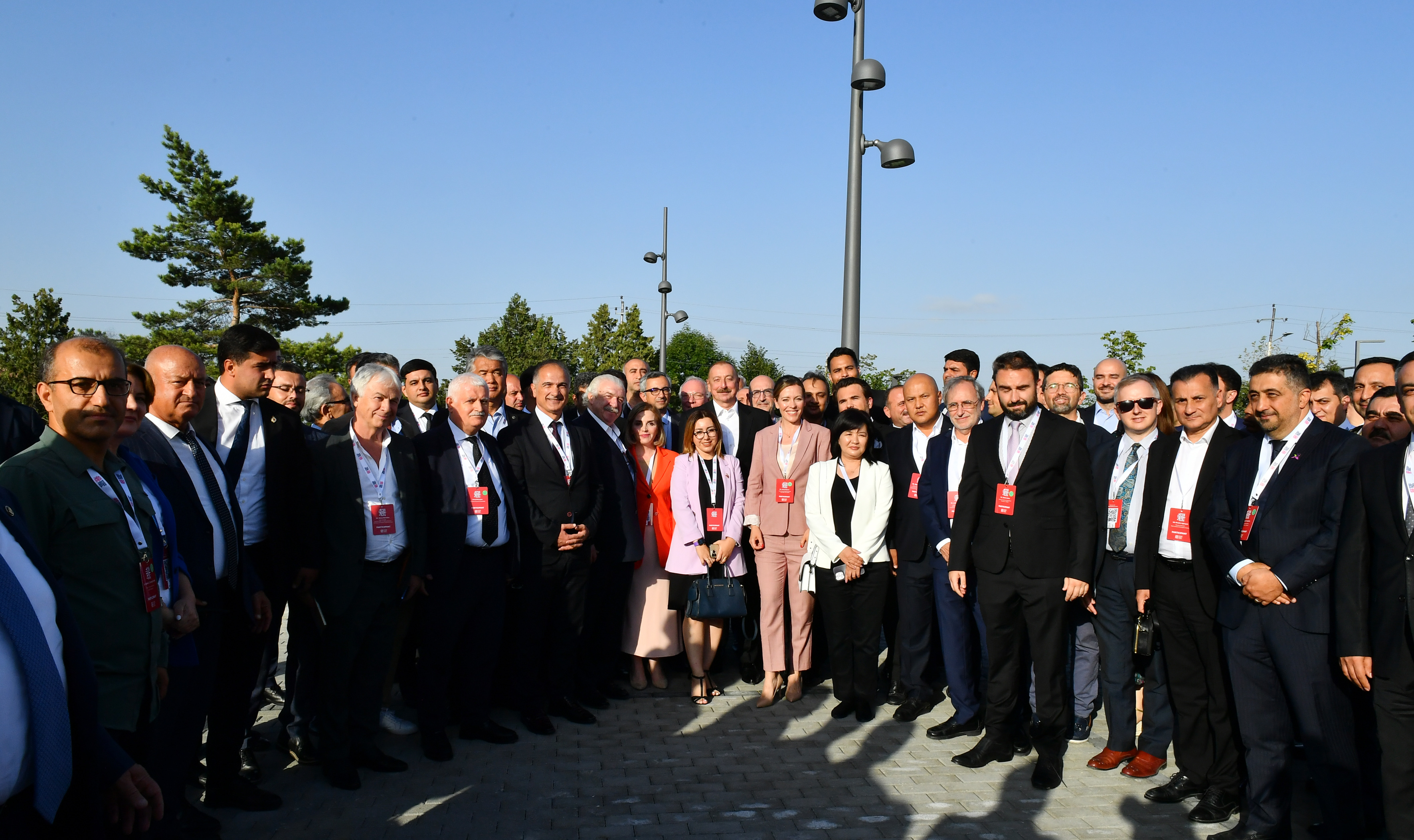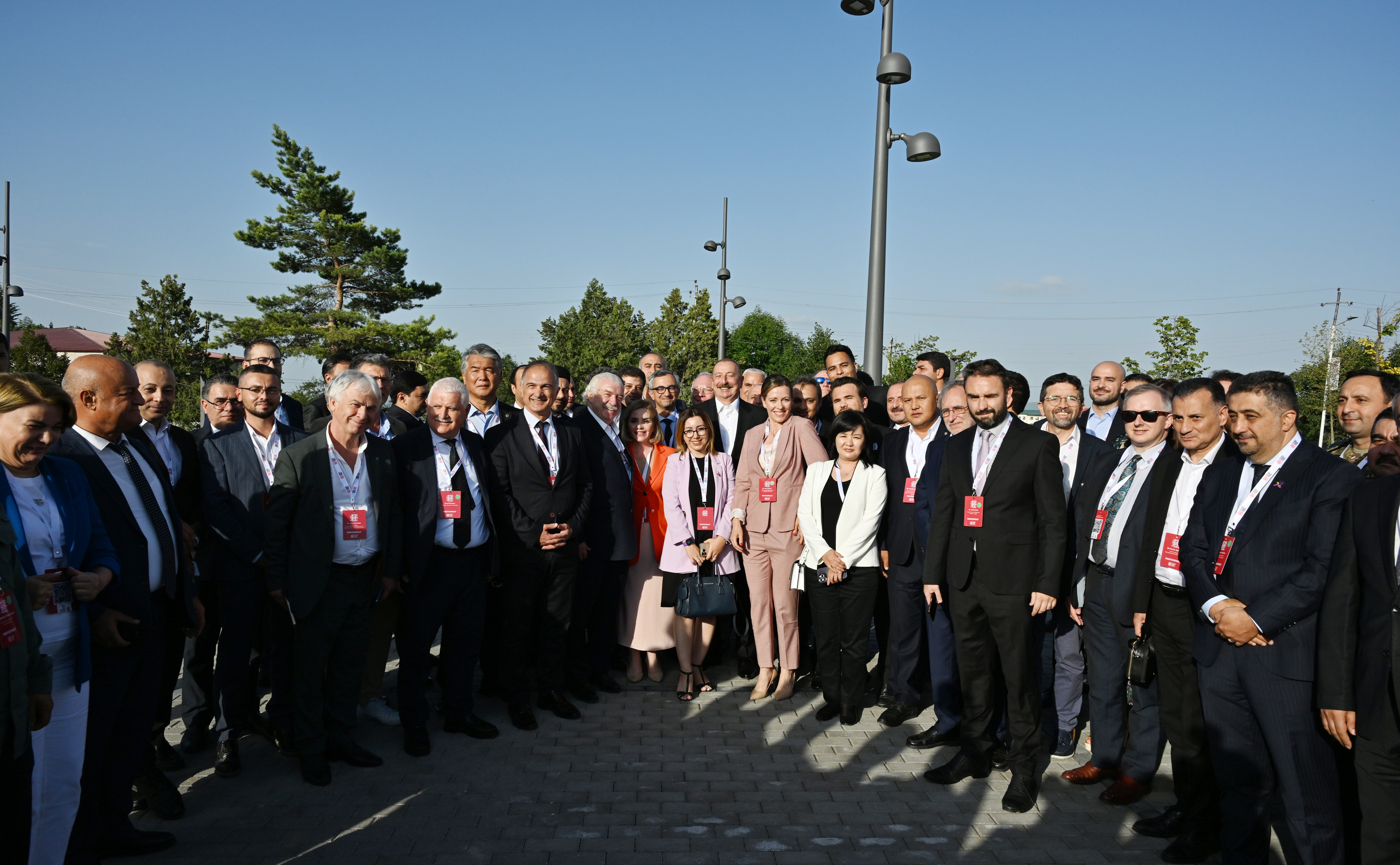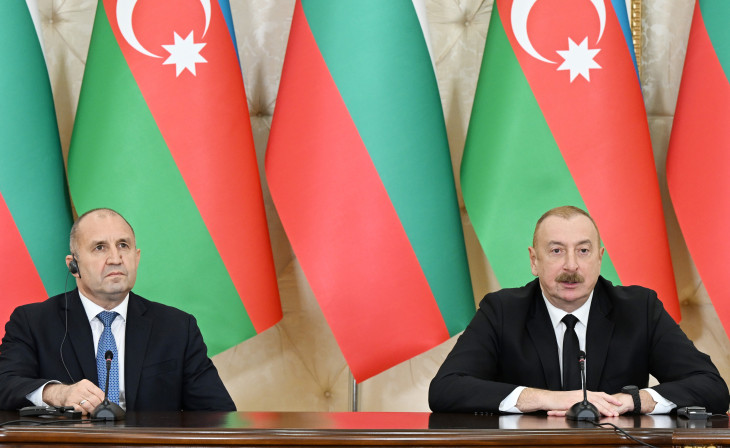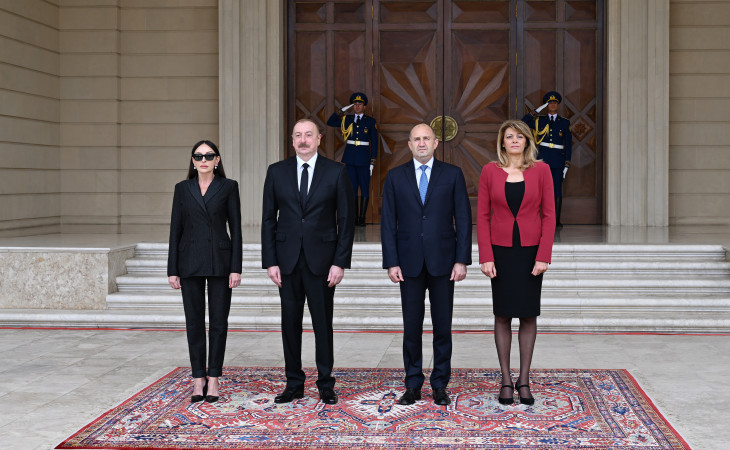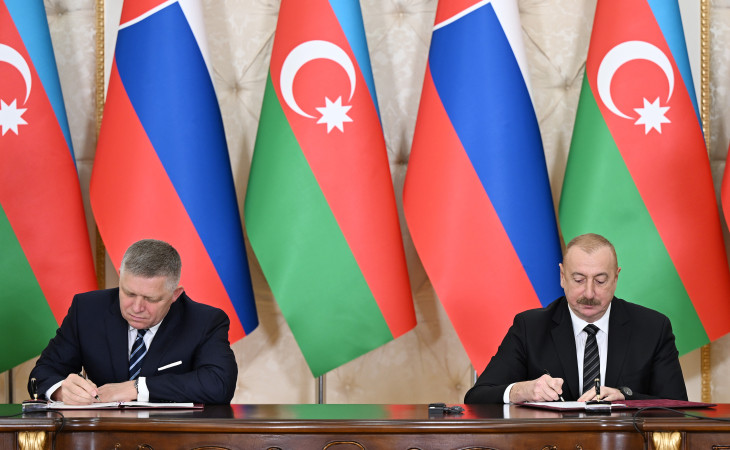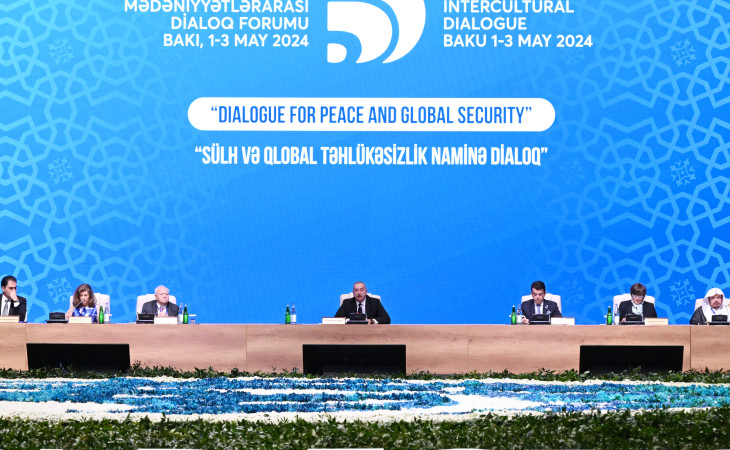Shusha hosted opening ceremony of Global Media Forum President Ilham Aliyev attended the opening ceremony
ID:
22.07.2023 05:00 / OFFICIAL NEWS
Photo : AZERTAG / Vugar Amrullayev
An opening ceremony of the Shusha Global Media Forum on “New Media in the Era of the 4th Industrial Revolution” has been held.
President of the Republic of Azerbaijan Ilham Aliyev attended the opening ceremony of the Forum and answered the questions.
An opening ceremony of the Shusha Global Media Forum on “New Media in the Era of the 4th Industrial Revolution” has been held.
President of the Republic of Azerbaijan Ilham Aliyev attended the opening ceremony of the Forum and answered the questions.
Addressing the event, President Ilham Aliyev said:
- Dear guests, ladies and gentlemen. Welcome to Karabakh, welcome to Shusha.
I am very glad to see you here, and thank you for accepting our invitation and participating in the Shusha Global Media Forum, which is a remarkable event for our country and, of course, for the Karabakh region.
Shusha is officially a cultural capital of Azerbaijan already. But at the same time, Shusha is a symbol of our victory and also a symbol of peace. Because after Shusha was liberated, the Second Karabakh War stopped. You came here through the liberated territories. From Fuzuli Airport to Shusha, you came by the road, which later was called by us the Victory Road. This road did not exist neither during soviet times, nor during the period of occupation. This road was opened by the courage and spirit of our heroes. That is a way how we moved, liberating cities and villages, moved here to this city, which is also a symbol of our courage. Shusha already hosted several international events, including the Khari Bulbul International Music Festival, Vagif’s Poetry Days, several international sporting events and now Global Media Forum. So, the city kept its identity despite the fact that it was very deliberately destroyed during the time of occupation.
I prefer not to have a long speech but maybe to have more of our discussions and to address issues, which are of interest to you. So, probably I will now conclude and give floor to the moderator.
Moderator: Your Excellency. First of all, we’d like to express our gratitude to You for taking your time to be with us. Ladies and gentlemen, as our President mentioned his kind participation here is for the purpose of exchanging ideas in an interactive form.
And now, with your permission, Mr. President, we are going to the questions from the participants. I would like to inform you that some of the questions have been collected in advance to save our time and I will read them out one by one. But dear participants, feel free to jump in with your questions at any time.
Mr. President, shall we start?
TRT World, Bora Bayraktar.
Bora Bayraktar: Thank you very much for your invitation. I'd like to ask a question about, of course, the Karabakh victory. We know that foreign relations between two countries, the personal relations of leaders are also important and they play an important role. And we know that Your Excellency has very good relations with the Turkish President, Mr. Erdogan. This special relationship played a very important role in liberation of Karabakh.
Mr. President, the President of Türkiye has won a five-year term. It means that now you have five more years together. It seems like a golden opportunity. What will be your priority in these five years in this process? I mean, what would you say we have to do together immediately? What is the first thing that you want to do with Türkiye?
President Ilham Aliyev: You are absolutely right. Our personal friendship with President Erdogan, I think, is known now not only to the regional community, but also to the world. This is a really important factor of regional development and regional stability. But also I'd like to say that relations between the peoples of Azerbaijan and Türkiye are based on long-lasting friendship and brotherly ties. So, this is a great foundation for our countries to develop and support each other. From the first days, even I would say, from the first hours of the Second Karabakh War, Türkiye, its people and its leader were side by side with us. The statement of President Erdogan in the first hours of the Second Karabakh War that “Azerbaijan is not alone” was a great moral support to us. Throughout all the 44 days of the Second Karabakh War, we felt the support from our brothers. President Erdogan several times publicly announced the position of Türkiye. At the same time, other governmental officials also elaborated on that. So, that was a great moral and political support to Azerbaijan.
After the victory in the Second Karabakh War, Azerbaijan and Türkiye formalized their relationship, which, actually, de facto were relations between allies. This relationship was formalized by signing the famous Shusha Declaration, which was signed a couple of 100 meters from this hotel and elevated our relations at the level of allies. This is really a big asset for our nations, for our peoples. This declaration actually opens new horizons in front of us. Though, even before that Azerbaijan and Türkiye in many areas demonstrated unity, solidarity, and mutual support. If we take the broad agenda of our cooperation, we'll see starting from political relations, energy, trade, transportation, defense, defense industry, and many other. So, it's easier to name the areas, where we are not very advanced rather than in the areas where we are closely working. I have no doubts that my brother President Erdogan will be reelected. Because what he did for Türkiye during 20 years in office is a demonstration of commitment to his people and to his country. Today, Türkiye is one of the global leaders. International influence of Türkiye is growing year after year. Of course, in Azerbaijan, it is difficult to find someone who was not happy with the results of the elections. In the coming five years, we will definitely continue our close partnership. The world is changing, the situation in the region is changing. We need to stabilize situation in the South Caucasus. We need to have sustainable peace and security for the future. The role of Türkiye in global affairs and in particular, in our region, of course, is a role of very important stabilizer. Policy of Türkiye aimed at regional security and regional development is highly appreciated in Azerbaijan and not only in Azerbaijan.
As you know, President Erdogan already paid a state visit to Azerbaijan after elections. This is a tradition between us, you know. I do the same after my reelections. And also, before that participating in the inauguration ceremony, we had an opportunity to address the issues of our future cooperation. Probably, I will not disclose all what we agreed on. But I think, it will not be difficult to guess that in the coming years, Türkiye and Azerbaijan will play more important role in our region. Of course, we'll use our potential in order to bring our countries closer.
Moderator: James Flue, the United States of America.
James Flue: Thank you, Mr. President. My question is about threats to Azerbaijan. And what you sort of view as the most important threats to the country?
President Ilham Aliyev: Well, actually, after the liberation of our territories, we don't see any potential threats to our country. Because, first of all, there are no internally generated threats. The country is stable. The level of solidarity among Azerbaijanis is high as never before. The country's economic development is very impressive. I don't want to go into details into figures, but those who are interested in that can see that Azerbaijan's economy is self-sufficient and based on our own resources and good management. So, in that respect, the oldest threats we had before was a threat coming from Armenia from its occupational policy. And that threat was here around, including in this particular place for almost 30 years. Now this threat, in general, have been managed. But of course, we must be on alert. We should not forget our past. We should not forget that we were stabbed in the back by our neighbors, when we did not expect that, and they took advantage of chaos in Azerbaijan and occupied our territories. Also, we should not forget that even now, despite the results of the Second Karabakh War, there are people in Armenia in different segments including government and in other parts of society, which live with revanchist ideas, and they do not hide it. Therefore, we must be ready for any kind of scenario. And for that purpose, right after the Second Karabakh War, despite the glorious victory, courage and spirit we demonstrated on the battlefield, we started immediately deepening reforms in the defense area. I already publicly spoke about that. Today, our army is much stronger than three years ago. This is a need, I think, which is based on our history, and also based on that, we see that international law norms are being violated brutally. Now, we see that international law is working selectively. We have faced that for many years, when we were raising our voice saying that, look, the United Nations Security Council adopted four resolutions demanding withdrawal of Armenian troops from our lands - immediate and unconditional withdrawal. But these resolutions were not implemented. So, now this tendency is spreading around. When international law doesn't work, when signature does not mean a lot, the only guarantee for peace is strength. So, having said that we cannot exclude potential threats, which may emerge in the future because situation in the world and in our region is quite unpredictable. For the time being, the level of external threats is not very high. But, probably also because of the fact that we are ready to manage those threats and to defend ourselves.
Mikhail Gusman: If you will allow me, I will ask my question now. My name is Mikhail Gusman. I represent the TASS agency.
Dear Mr. President! A little over a year ago, on February 23, we had the honor of welcoming you together with colleagues, some of them are here today, at the TASS agency, together with leaders of the Russian media. This was the day after you signed the Moscow Declaration with the President of Russia. More than a year has passed. The world is in a very turbulent state. After the victorious 44-day war, Azerbaijan is consistently working, but so far it has not been possible to conclude peace with Armenia. Russia is conducting a special military operation. And yet, how would you assess the development of this memorandum you signed? How is it being implemented? What are its prospects? Are there any problems in the implementation of this Memorandum, which was signed in Moscow on February 22?
I will also have a second question. Thank you.
President Ilham Aliyev: In my opinion, the declaration signed in February last year was a milestone in Russia-Azerbaijan relations. The declaration covers the history of development of relations, which developed differently in various periods of independence and reached the level of strategic partnership just as both countries declared for long years. This was really so because if we look at the scope of work done by both countries, the two sides set a goal of strengthening relations and results-based cooperation.
We know very well how deep these relations are and the scope of international is quite broad. Russia played a key role as a mediator for many years and played its part in ceasing military operations and settling the Armenia-Azerbaijan relations and Nagorno-Karabakh conflict as one of such areas.
We all remember those days very well. It was the Russian side that acted as a link between Armenia and Azerbaijan, I mean between the leadership of the countries, on November 9, 2020 when the trilateral statement was being coordinated. Therefore, the signing of the Declaration on Allied Interaction had a solid foundation.
As for the period we are going through after the signing, this period is completely new for the peace, for our region, including Russia and ourselves. But despite this, despite such a serious change in the geopolitical situation, the development of relations between Russia and Azerbaijan since the signing of the Declaration has been quite successful. There have been many contacts at the highest level, there have been contacts at the level of heads of government, ministers of foreign affairs and other representatives of governments and state bodies. Therefore, I can say with full confidence that provisions of the Declaration are being fulfilled. The most important thing is that there is political resolve at the level of the leadership. Taking the opportunity of the presence of media representatives here and the fact that you will discuss these issues tomorrow and the day after tomorrow, both cooperation and problematic issues, I would like to say that those small rough edges that we see in the Russian media in relation to Azerbaijan and in the Azerbaijani media in relation to Russia have no influence on the policy of Azerbaijan and Russia.
We know this quite clearly. But this is also, as they say, a tribute to the time when media representatives are completely free in their assessments. Since the situation is changing dramatically, including our region after the Second Karabakh War, the situation in the world after the start of the Russian-Ukrainian war, then, naturally, different assessments, different analyses and different opinions are inevitable. But again, taking this opportunity, I want to say that in any case, such moments do not affect the political will of the Azerbaijani leadership. Therefore, I think that the future of our relations will be as positive and successful as in previous years. Considering that you started your remarks in Azerbaijani, I think that you can ask the second question right now. Otherwise, you may never get another opportunity.
Mikhail Gusman: Thank you, Mr. President. Before asking my question, I would like to express my gratitude to you personally and to the organizers of this Forum. Because I visited the liberated Shusha two years ago. I was lucky enough. Shusha is also changing in a spectacular way and the Forum is also organized at an exceptional level. My second question is that Azerbaijan has been successfully leading the Non-Aligned Movement for the last few years, and a month ago, I contacted your successor, Ugandan President Museveni. He talked about Azerbaijan's successful leadership of the Non-Aligned Movement over the years and emphasized that Azerbaijan had breathed a new life into it. I have two questions about this. In which direction do you see the further development of this movement? Secondly, a women's forum and a youth forum were created here during the period when Azerbaijan chaired the Movement. We are also considering the media. How would you see the evaluation the prospects for organizing a media forum of the Non-Aligned Movement in Azerbaijan? Thank you.
President Ilham Aliyev: Thank you, this is a very good idea. I think that it will be fully accepted by us. We don't have much time left as our chairmanship ends early next year. Therefore, in order to have time to do this, we probably need to work together. As you know, initiative is punishable, so I invite you to take an active part in the preparation of such an event.
This will be very useful, especially considering that, as you noted, the Non-Aligned Movement – I can say without false modesty – received a second breath during Azerbaijan's chairmanship. It is no secret that the influence of the Movement had been gradually in decline and it had become a platform for discussing certain issues that did not have much of a continuation. As is the case with any work we do, we treated this work with great responsibility and began to work step by step in the direction of institutional development. And I think the fact that Azerbaijan's chairmanship was extended by a unanimous decision for another year, and in fact for a year and a half, shows that our activity was appreciated and is in demand. In addition to the formats you mentioned, I would also add a parliamentary platform, this is also a very important element in terms of institutional development. We believe that this is the path the Movement should follow. Of course, after we transfer our powers to Uganda in a few months, we will be in the trio for some time, while Uganda presides. Of course, we will actively participate in consolidating efforts, filling the activities of the Movement with concrete results.
I must say that during COVID we showed leadership in drawing the attention of the world community to this problem. Azerbaijan as chair was one of the countries that actively opposed vaccine nationalism. We didn't hesitate to call countries by their names – the ones that bought five times more vaccines than they needed, while many poor countries found themselves unprotected. Among other things, it was simply shameless. On our initiative, a database was created in the countries of the Movement, which was also used by the World Health Organization, not to mention the fact that we allocated 10 million US dollars for humanitarian and financial assistance and provided assistance to many countries with vaccines. So, the countries of the Movement saw that this structure, although it is not an organization, can achieve its goals.
At the summit in Baku, when we took over chairmanship, I said that we would protect international law, justice and the legitimate interests of member countries. I think that we have successfully coped with this task. And I would like to believe that after we transfer the powers of chair, the positive dynamics will be continued. In any case, we will do everything to ensure that this is the case.
Moderator: Mirshahin Agayev, “Real” Analytical and Information Center.
Mirshahin Agayev: Mr. President, I would like to thank you for giving us the opportunity to ask questions of the President of the Republic of Azerbaijan in Shusha after 29 years. Let's keep in mind that tomorrow is the National Press Day, it is a holiday for all of us, and let me ask you to accept my gratitude on behalf of all our media as the head of state, as the Victorious Commander-in-Chief, for making this holiday even more magnificent.
My question is about your hand sign. It can be like this, when you extend your hand, and like this, when it becomes an Iron Fist. We have heard this statement a lot in Shusha, and every time we have seen the real echo and impact of this statement. My question today is a little below Shusha, about Khankendi. You know that the remnants of the separatist forces are carrying out certain events there and are engaged in disinformation. Azerbaijan is said to be allegedly blocking someone and something although I recently prepared a special edition of the “Mirshahin's Time” program on Lachin road, and we saw everything there. We saw Red Cross vehicles coming and going through there, how warm and gentle the attitude towards people is. This is one thing.
Among the tasks facing the “New Media in the Era of the 4th Industrial Revolution”, what do you require from us in order to combat this type of disinformation? Because you brought us Victory. You were in front of us in our media struggle, and you were the key person in breaking the information blockade of Azerbaijan. We followed you. Therefore, I want your advice in this matter. Thank you.
President Ilham Aliyev: Thank you. I think that the Azerbaijani media are doing great things in this direction. Of course, the general direction is already clear. All of us, regardless of the position we held during the occupation period, every patriotic Azerbaijani tirelessly went towards this goal. In my speeches, I said many times during the occupation that this day would come, the day of freedom would come, each one of us must bring this day closer, and we brought it closer and closer. This is our national Victory. In other words, the people of Azerbaijan deserved this Victory.
Of course, the restoration of international law, the restoration of our territorial integrity – all these are fundamental rights, and we won this right on the battlefield by shedding blood and giving martyrs. However, at the same time, the activity of the Azerbaijani media in this field is valuable, because the media was our first tool to convey the problem we are facing to the world community not only from the perspective of international law, but also from the general human perspective. This is why I always mentioned this during meetings with media representatives in the previous years, i.e. during the occupation period. I mentioned that we should reach bigger international audiences.
You will probably agree that what we were saying in the past was falling on deaf ears. It was as if we were trying to prove something to ourselves. It was important. It was important to keep the issue on the agenda and to educate the younger generation in the spirit of patriotism. Most of our sons who liberated Shusha and all the other occupied lands had never seen Shusha, Aghdam or any other occupied land. In other words, education at home, education in schools and keeping this issue on the daily agenda by the media strengthened the internal unity to a huge extent. Of course, state policy was always at the forefront. However, at a later stage, we started speaking to a more international audience. That is, we have these opportunities, and there are publications of many of our media resources, websites and other electronic means in various languages. Today, we are destined again to prove our truth. Because the campaign against us continues to this day. We must and we do respond with solid and real arguments to those who cannot digest our Victory, who are jealous of our success and who have started an open information war against us. It is the result of this that today, despite all these slanders, libel and lies, the voice of Azerbaijan, the rightful voice of the Azerbaijani people and state is being heard, and our media are the main tool for this. Therefore, the solidarity and unity in society provides us with this advantage.
As for recommendations, to be honest, I am a bit far from this. Because the independence of the Azerbaijani media is one of the main conditions for the development of our society. Secondly, you know everything perfectly well yourself, and I am very glad that the healing process in our media is progressing successfully and articles that are against the interests of the people and may harm the interests of the state are now very rare. That is, this is again a factor that indicates the responsibility of the media. So, my advice to the media is to keep it up.
Moderator: Mr. President. It's quite active here and we are getting some questions from our participants. I do believe that we will have enough time for all questions. Next question from Jordan Morgan, the United Kingdom.
Jordan Morgan: Mr. President, thank you very much for the hospitality. My name is Jordan and I'm from the UK. My question for you. What opportunities do you see for Azerbaijan and the West Asia region since China brokered Iran-Saudi rapprochement? And what opportunities are present for Azerbaijan? Thank you.
President Ilham Aliyev: In respect with our relations with Asian countries, you mean?
Jordan Morgan: This whole region.
President Ilham Aliyev: Well, regional development here in the Southern Caucasus largely depends on the normalization of relations between Azerbaijan and Armenia. We have now international actors, which should try to help us to find a mutually acceptable solution. And fortunately, what we've seen so far is clear that all international actors understand that this solution must be based on international law. And now, after almost three years have passed since the end of Second Karabakh War, we hear more and more very straightforward statements that Karabakh is Azerbaijan. If that was the case during the times of occupation, probably the Second Karabakh War wouldn't have started. But unfortunately, during those years - 28 years, negotiations under the umbrella of the Minsk Group not only produce zero result, but also actually did not elaborate the formula, which must be taken as a basis for settlement. They're ambiguous and sometimes contradictory statements, not to mention actions, actually lead to the freezing of the conflict. At some point, we realize here in Azerbaijan that their goal is to freeze the conflict and make occupation endless through different so-called public diplomacy initiatives to impose an understanding that we should start cooperation, we should start doing business with Armenia, and the conflicts will be resolved by the future generations.
Many times, during the times of occupation, I publicly raised the issue of imposing sanctions on Armenia. I was explaining this position by international organizations` decisions and declarations. The United Nations Security Council resolutions, the Council of Europe, the Parliamentary Assembly of the Council of Europe decisions, even the European Parliament - though, it now takes a very pro-Armenian stand but even the European Parliament once adopted a resolution, which reflected the reality. But it did not happen because their geopolitical agenda was different.
So, we had to do it ourselves. We had to implement the Security Council resolutions of United Nations on the battlefield. Now, situation is different. By the way, at that time, none of those international players who today say “Karabakh is Azerbaijan” never said that. They said that with respect to some other protracted conflicts in the post-soviet area, but not about Azerbaijan. When it came to Azerbaijan, their narrative was “you have to agree”. You have to integrate self-determination and territorial integrity understanding, which is not possible. It is not possible. Fundamental principles of international law like territorial integrity and self-determination of any nation should not undermine territorial integrity of countries, especially, when this nation has already self-determined itself once having independent Armenian state.
So, now situation is different. And now, international brokers are, how to say, expressing their position from a more realistic point of view. Because I always said that I heard many times during the times of occupation that Azerbaijan has to take into account the reality. And now I say yes, I agree. Now everybody should take into account the new reality. One cannot think about any peace agreement with Armenia, which is not absorbing the reality of the 30-year occupation and destruction, and the reality of the results of the Second Karabakh War. But so far, the efforts of international actors are not enough. At the moment, we have three international actors who are providing the assistance - the United States, Russia and the European Union. And on three tracks, Azerbaijan works in good faith and with result-oriented approach. But so far, it did not end in any result. Because Armenia needs to make, I think, one of the final steps. They already made several steps after the war, I would say that these were not the steps, which they made voluntarily. There have been several cases during the last two-and-a-half years, several episodes. I would name it like it clearly demonstrated to Armenia that if they do not recognize our territorial integrity, we will not recognize their territorial integrity. And what will mean for them is more or less clear. They already accepted that Karabakh is Azerbaijan publicly. Now they need to put their signature under the document. This is one of the final steps and there must be some more. But if that step is made - negotiation teams on the level of foreign ministers are going to hold the next round of negotiations to take place in the coming days in Moscow - if Armenia will agree on that paragraph, where they totally refrain from any territorial claims to Azerbaijan, I think, the signing of a peace agreement can be realistic by the end of the this year. If not, well, I said many times, if they don't want to have a peace agreement with us, we cannot force them. We could not force them to comply with international law for 28 years. We managed only to force them by force. But in this case, there'll be no peace. Well, it's not the best scenario for the region. It will not add stability, security. And also taking into account the very fragile geopolitical situations that may create complications in the future. So, we have three brokers. All of them have enough international mechanisms to work independently. We hope that on one of these three tracks, we will see progress.
Moderator: The next question from Maurizio Geri, Italy.
Maurizio Geri: Mr. President, it is my second time in Shusha. Thank you very much for having us here. My question is related with the last two weeks I spent in Baku for the Energy Summer School in ADA. So I would like to ask you the role of Azerbaijan as a bridge between Europe and Central Asia. In particular, gas and other energy from countries like China and Russia. So, I know that there are projects with Turkmenistan. I know you said you would be happy with it if the Turkmenistan decides to do it. What could be the help that Italy or Europe could give you to support you in this process?
President Ilham Aliyev: With respect to the Trans-Caspian Gas Pipeline project, several times I already expressed our position. I want to repeat that this is not the project, which Azerbaijan will initiate. Because usually the projects, which are initiated by the countries, other projects based on these country's resources as we did for instance with the Southern Gas Corridor. We initiated, we were their major shareholder, and we were actually their coordinator of all intergovernmental relations and agreements. As you know, this project was successfully implemented, and already for more than two years Azerbaijan became an important gas supplier to Europe. The President of the European Commission names Azerbaijan a reliable partner, and the Energy Commissioner of EU calls Azerbaijan a pan-European gas supplier. And this is true, because geography of our gas supplies to Europe is becoming broader and broader, and hopefully by the end of this year, two more European countries will be recipients of Azerbaijani gas.
With respect to the Trans-Caspian. This project as an idea is based on the gas resources of Turkmenistan. Therefore, it's not up to us to initiate it or to invest in it. What can we do? We can provide our existing infrastructure or can provide infrastructure some land in their possession in order to build a new infrastructure. But I think, it's also important to know that today, Azerbaijan is working on expansion of the pipeline, which was built less than three years ago. Why? Because demand in Europe is growing. The pipeline, which was designed for 10 bcm like TAP, now, needs to be expanded up to 20 bcm. TANAP from 16 to 32. That was not expected by us. Because situation has changed. So, why we talk about expansion is that Azerbaijan will produce more gas and is producing every year more gas than year before. For instance, if 2021 we exported 19 bcm, last year, it was more than 22 bcm, and this year, probably it will be 24 bcm or even more. And these months - that's in the time when we didn't see each other - we already announced the discovery from the Absheron gas field, which possesses at least 300 billion cubic meters. And the first well is already producing gas more than any well on Shahdeniz. So, in other words, expansion of our pipeline system is based on our growing resources. For additional gas from Eastern shores of the Caspian – first, the Trans-Caspian Gas Pipeline must be built under the sea, and second from Baku to the European destination, another something like the Southern Gas Corridor must be built. And the main question is who will finance these important projects? And we don't have an answer. Therefore, before we find an answer who will finance it, I think, implementation or even some ideas about that will be unrealistic. And also you know very well that now European banks stopped financing the projects of fossil fuel. Therefore, it will be difficult to raise substantial money for that. Because, when we were building the Southern Gas Corridor, apart from corporate financing, we had financing from EBRD, EIB, ADB and also from the Asian Infrastructure Investment Bank. But now two of these European institutions - they are out, I hope temporarily, from the fossil fuel financing, therefore, who will finance it? The green transition makes implementation of this project even more complicated. And the fluctuation of the gas prices in Europe, which we see also creates a lot of questions. By the way, also the price cap, which, I think, was absolutely unacceptable for the consumers to put a limit for the price. This is totally in contradiction with any market economy principles, which these countries were advocating for many years. So, in other words, from realistic point of view, this is very problematic. But again, if someone decides to build the Trans-Caspian Pipeline, we will be only happy. We will have more transit fees and more cooperation.
Vusala Mahirgizi, head of APA group: Mr. President, I want to ask you about the Return. The relocations to Lachin are currently underway as part of the Great Return. Residents of which district will be welcomed in their districts at the next stage? My second question may seem a little personal to you. When Karabakh was liberated, you were the first to go there, followed by our army. You have been visiting Karabakh very often, and every time you come, new projects and new places are opened. How does that make you feel? A completely ravaged place being rebuilt from scratch. How does that feel? How does it feel to be a winning President in general?
President Ilham Aliyev: You know, the emotions I experience are no different to those felt by the people of Azerbaijan. The only difference is that I see these places so often. Most people see it on television, but at the same time, as you know, there are now tours to liberated areas and, as you mentioned, citizens are quickly returning to the liberated lands.
Of course, first of all, I feel proud. Every time I come to Karabakh and Eastern Zangezur, the first thing I feel is a sense of pride. Because it is impossible not to be proud of my people, our Army, our heroes, and every time you also come to Shusha along Victory Road, just look at how our heroic soldiers and officers with only light weapons covered this road, how they died in hand-to-hand battles in the face of the enemy armed with cannons, tanks, and artillery. This is how high the spirit of the Azerbaijani people is. In other words, all this showed the qualities of our people to all of us again. It once again showed to each of us, first of all, and to the whole world how high the moral qualities of the Azerbaijani people are.
It is very hard for each of us to see the destroyed cities and villages. We cannot come to terms with this pain. Although I have already been to the liberated lands perhaps a hundred times in the last three years or so, every time I see the ruins, my heart hurts. I ask myself every time. Why did the people we consider neighbors resort to this barbarism? What did we do to them? We were the defeated side in the First Karabakh War. We did not destroy their cities, we did not destroy their graves, we did not remove the bones of their dead. Why did they do this? How much hatred did these people have in their hearts for us to commit such inhuman acts? I mean I still can't understand that and probably no normal person can ever understand it.
At the same time, every time I see a new development project or participate in a groundbreaking ceremony, it feels as if blood is being pumped into my veins, in other words, that is, it gives me so much positive energy that this positive spiritual energy also strengthens a person physically. It is not just about the weather of this region. I am sure you feel the same way. We say a lot about how we feel good in Shusha or Zangilan or Lachin. Not only because of the weather. What is happiness? Happiness that comes from within. Many have asked themselves, but every time I see this development, I say to myself that this is probably what happiness is.
As for the Great Return program, we have now approved the Master Plan of more than 30 cities and villages, the foundations of many villages have been laid and the figures have already been announced. We will return more than 150,000 people to both Karabakh and Eastern Zangezur within the next three years. Now we are at the preliminary stage of the work, as they say, because the design takes a long time, the tender procedures take a long time. We want everything to be in order, according to the law, to be completely transparent, and this takes time, it does take time. I am sure that the former IDPs understand this. To the Karabakh region alone, 140,000 people are expected to return by 2026. I already hope that next year the first residents will arrive and settle down in the city of Shusha. Now, you probably haven't had the time today, but you will probably walk around in the evening or tomorrow, and you will see that in several places construction projects, namely the construction of residential buildings, are already underway.
Of course, the demining process was the biggest obstacle. Because the work we have done during these two and a half years not only shows that we have financial opportunities. It also shows that we have very serious experience and professional personnel. I don't think anyone would have thought of implementing projects on this scale in a matter of two and a half years. No-one could have imagined that in just two and a half years, such large-scale work would be carried out on a large area covering 10,000 square kilometers. This is why the Azerbaijani public is periodically updated about the plans and the work done. When master plans of the cities were approved, the opinions of the people who lived in the cities were taken into account, and I attended the groundbreaking ceremony for the reconstruction of cities together with the former IDPs. In other words, we really want people who have suffered morally and physically for 30 years to be provided with the best conditions, and we are moving towards that and will continue to do so.
Moderator: And the next question from Majeed Shawkey, Egypt.
Majeed Shawkey: My name is Majeed. The Middle East News Agency, Egypt. Mr. President, you have talked about threats to your country and your efforts for the development after the war. How far landmines are affecting the daily lives of ordinary people and how far these landmines are affecting the efforts for development? And if there are any plans for removing these mines, given the high cost of the process? Thank you very much.
President Ilham Aliyev: Yes, you touched upon probably the most important issue. Because landmines already claimed almost 300 lives and serious injuries of our civilians and military personnel. So, 300 mine explosions on the liberated territories, because of these war crimes. Planting landmines is a war crime. But not giving us the maps of landmines is a continuation of the Armenian terror. Because we know that they have it. This is how the mines are being planted. Those, who plant the mines, they have to have a map. Otherwise, they themselves can be victims of those mines. They first denied on the very high level, on the level of the Armenian Prime Minister that they have mine maps. Then, finally they admitted that they have it. That means they were lying to us at first. And why were they lying to us? They wanted Azerbaijanis to be killed, to continue to be killed, losing their legs, being severely injured. When they announced that they gave us the maps, and we started to check the accuracy of those maps, which was not as high as 25%. You can imagine that it means nothing. It means that these maps are absolutely useless. We are undertaking very serious efforts in demining. We purchased equipment, special machines, the mining machines. One of our local companies started to produce demining machines in Azerbaijan. We invited private companies to join the efforts, and several private companies already were established, which already started the demining process. Our State Agency ANAMA, along with the battalions of the Ministry of Emergency Ministry, specialists are working day and night to clean the area. But according to our estimation more than 1 million mines have been planted. The maps, which Armenians gave us, cover about 400,000. That means that they admitted that 400,000 have been planted. But we know that it is more than 1 million. So, it's very credible information. We received several proposals from international companies to work in this area. But unfortunately, the price was very high. I don't want to go into much details, but on average it was 8 to 10 times higher than the cost of demining of one mine. So, in other words, Azerbaijani local companies and ANAMA are demining the area 8-10 times cheaper than foreign companies, which applied for this job. We started to use drones thanks to good brains of some people. There are drones now, which detect the most contaminated places by mines and it is helpful. But at the same time, we can understand that it's a long process. Unfortunately, we should understand that there will be more victims and more casualties. So, the mine terror of Armenia continues. The most important is the fact that the areas, which have not yet been cleaned, are isolated now. Restricted access to the liberated territories helps us to minimize the casualties. But after the former IDPs will return, they must be very careful. I want just to use this opportunity once again to apply to them, I made it many times, to be very careful and not to go to the places, which are not authorized. This is really very dangerous and this is one of the biggest threats, which we will face for many years in the future unfortunately.
Moderator: Gela Vasadze, Georgia.
Gela Vasadze: Mr. President, first of all, thank you very much for organizing such a large-scale and wonderful event. I am really impressed. I agree with you that there are just a few steps, perhaps even step to peace. But peace depends on how far the process of integration of the Armenian population of Karabakh goes. When they tell me about people, when talking with friends, I ask them: “Give me the phone number of these people.” Do you have the phone number of Karabakh Armenians? Do you know this phone? Thank you.
President Ilham Aliyev: We have repeatedly expressed our position on this issue and have shown maximum constructivism. But, unfortunately, the junta that seized power in Karabakh and which calls itself “presidents”, “ministers” or “deputies” is only causing everyone to laugh. They have taken hostage those who now live in the territory where the Russian peacekeeping contingent is temporarily stationed.
We took the initiative, I appointed a special representative who was supposed to deal with representatives of the Armenians of Karabakh, and in order to establish these contacts, he was sent to Karabakh. The first meeting took place there, in the village of Khojaly, at the base of the Russian peacekeeping contingent. After that, we invited representatives of the Armenians of Karabakh to come to Baku to continue the dialogue. But they refused, and quite defiantly. After some time, we invited them again – perhaps there was some kind of a mistake, it happens, a misfire – in order to find out whether they want it or not. But there was a refusal again. And then I said that there would be no third invitation. If they are not interested, so be it.
Well, what happened next you probably know – the establishment of a border checkpoint on the state border of Azerbaijan and Armenia. If you trace the chronology of all our actions, even if you go back before the beginning of the Second Karabakh War, you will see logic and a very strong argument on our side. We did not do anything for which we would be ashamed or we could say, “yes, we are wrong there.” We did everything right.
We gave them a chance, including the Armenian leadership before the start of the Second Karabakh War for two years, but they did not take advantage of it. We gave them a chance at a time when the Lachin-Khankendi road was just a “thoroughfare” through which Armenia transported mines that were produced in Armenia in 2021. And we discovered these mines. We found them. We invited representatives of the Russian peacekeeping contingent, as well as representatives of the Russian-Turkish monitoring center, which is located in Aghdam, demonstrated that to them and asked: “How did these mines get into Karabakh? Who brought them? And who was supposed to watch? It is unacceptable for us to die after the Victory on our own territory because Armenia continues its policy of terror.
Therefore, all our steps were logical, justified, legitimate, competent and sufficiently courageous. So, the establishment of a checkpoint on the border is an important stage in the post-conflict situation, which has significantly changed the landscape and the fact that these actions were fully accepted, although not immediately and not entirely willingly by all actors, but they were eventually perceived as legitimate. It was also a message. But how many times are we supposed to send messages? How many times can we hint? Was it not enough? The Farrukh operation, the situation on the border between Armenia and Azerbaijan in May 2021, the situation on the border in September 2022, and the border checkpoint. Well, how many messages should we give to them? Are they really so slow-witted?
Therefore, the issue of reintegration depends on when the Armenian residents of Karabakh will be able to get rid of these shackles, of this junta that took them hostage and exploited them as slaves. It is still exploiting them now, because when eco-activists came to the Lachin-Khankendi road, the Armenian leadership, the so-called leadership in Khankendi did not allow ordinary citizens to use this road. They set up a roadblock, accusing us of the blockade. Today they put up concrete blocks on the Aghdam-Asgaran road again. When you said, “why do products have to be shipped from another country? After all, Karabakh is Azerbaijan.” Right? It is, isn’t it? Doesn’t everyone recognize it as such? Everyone recognizes it. Does anyone say it is not? No! And why should goods be delivered from another country? This is illogical. But instead of accepting this gesture, concrete blocks were placed there. So, who is blocking whom? This is the whole point.
And today’s comedy show they are staging when they sit in a tent and protest against someone. It is just a joke, you know. People who call themselves “president” protest, do a sit-in strike – we have some journalists joking that the next stage will probably be a lying down strike. Whatever it is, it won’t help the case. We are ready to follow the path of reintegration, respecting the rights and security of the Armenian minority in Karabakh within the framework of our Constitution and within the framework of the good practice of how these issues are resolved in Azerbaijan as a whole.
Azerbaijan is a multi-ethnic and multi-confessional state, and this is our strength. All representatives of ethnic groups living in Azerbaijan have the same rights and obligations and the same level of security. So, why should some ethnic group stand out against this background is also not entirely clear to me. This is our approach. We still have not lost hope that the sensible part of society that lives in Khankendi and its environs will understand the futility of ignoring of Azerbaijan and common sense will prevail. Otherwise, I think that only naive people can count on the fact that someone will come and fight for them. They had several stages when they had to understand and come to terms with the realities.
They appealed to different authorities, to different countries starting with neighboring ones and ending with some countries that are located further away. But no-one in the right mind will fight against us on the territory of Azerbaijan for them. Therefore, they must eventually understand and accept these realities. I have already said this. I was told many times by mediators during the occupation, that “the First Karabakh War ended like this, so you must accept the realities”. But I wasn’t accepting them and did not. I am saying again: accept these realities, and these realities will only change – if they do – not for the benefit of either Armenia or the Armenian minority in Karabakh. Therefore, I hope that they will hear these words and draw the right conclusion.
President of the Global Policy Institute, Paolo von Schirach: Mr. President. Thank you for your hospitality. You won the war, you need to win the peace. What message could you give to the American private sector, corporate economy, which are interested in business with Azerbaijan. Of course, everybody knows about oil and gas. What about other sectors of the economy? What would be your message to American business leaders who are interested in partnering with Azerbaijani companies, where the benefit should be transparent and mutual with particular value for your country and the people who suffered so much because of this horrible war? Thank you.
President Ilham Aliyev: One of our priorities now is to stimulate the development of the sector, which is not related to natural resources. And that program is being successfully implemented. Year after year, we increase not only the share of the non-energy economy in our GDP, which is now more than 50%, but also increase our non-energy related export. My message would be that now capital goes to the places where there's a predictability and stability, which is a case in Azerbaijan. That was here for many years, even during the times of occupation. But definitely the Nagorno-Karabakh Armenia-Azerbaijan conflict being unresolved created certain probably frustration and was elevating certain risks. After the Second Karabakh war is over, this risk is very minimum in general.
So, our government has a very predictable policy with respect to development and also with respect to improvement of business climate. I think that foreigners who live and work in Azerbaijan can also prove that in recent years, there have been very serious, positive changes in management, including our fiscal system, including corporate management in our companies. This process is already in the final stage of full compliance with international standards. The country’s economy is sustainable, foreign debt is below 10% of GDP. And currency reserves exceed the foreign debt 10 times. So, in principle, if we decide, we can zero the foreign debt within one week.
Trade turnover has a high surplus. During these six months, we had 10 billion US dollar surplus in our export over our import. Political situation is stable. Azerbaijan proved itself as a reliable partner in oil and gas, and at the same time, is now working actively on issues related to connectivity, taking into account the geographical location and already very modern transportation infrastructure. So, these are general messages to companies, which probably think it's a good idea to come and try to work in Azerbaijan.
With respect to the areas, which are now priorities for us, of course, number one is reconstruction of the liberated territories. We have a growing number of foreign companies, who are working here as contractors.
Another important sector, which we are actively working on, is digitalization. And already substantial financial resources have been channeled to that sector. I know that some American companies are already showing interest to the renewable energy area. We have discovered a lot of potential. Those who know Baku are aware that Baku is a very windy city. When the wind was very strong, it always created certain problems. But at the same time, now we found out that wind will generate a lot of money in the Caspian. So, the IFC already made the assessment and testifies that there is 157 gigawatt of wind power only in the Caspian Sea. Foreign companies have already started several investment projects in renewables. Last December, an agreement was signed between Azerbaijan, Georgia, Hungary and Romania and witnessed by the European Commission to build an integrated green energy line from Azerbaijan to Europe going under the Black Sea. So, feasibility study already started. We expect the feasibility study to be presented probably in September-October. The first steering committee of the projects was held in Baku this February.
The first 240-megawatt solar power station is to be inaugurated by the end of this year. But this is only the first. We already signed MoUs and contracts at the level of 10 gigawatts. So, if half of these MoUs is materialized, that will be more than enough to supply big geography in Europe. At the same time, it will save us a lot of natural gas, which we use now to generate electricity and that natural gas will go also to the international market. So, it's a win-win situation.
2024 © AZERTAC. All rights reserved. Content from this site must be hyperlinked when used.


